#my friend: RUSSIAN NOVELIST FYODOR DOSTOEVSKY??
Text
sometimes I start talking about bsd characters and have to let people know mid conversation that I am, in fact, talking about anime characters and not the real authors
#me: if given the chance I would fuck fyodor fr#my friend: RUSSIAN NOVELIST FYODOR DOSTOEVSKY??#me: wait no-#the conversations are always wild#they're like whats bsd abt#and im like plants vs zombies except they're famous authors turned into anime twinks with abilities#no other way to explain bsd without going into a 5 hours rant#bungou stray dogs
68 notes
·
View notes
Text
Creative reading📚

📍 Activity title - creative readig
📍 Duration - long term activity, 4 to 5 times a week for 1-3 hours
📍 Type of activity - creativity


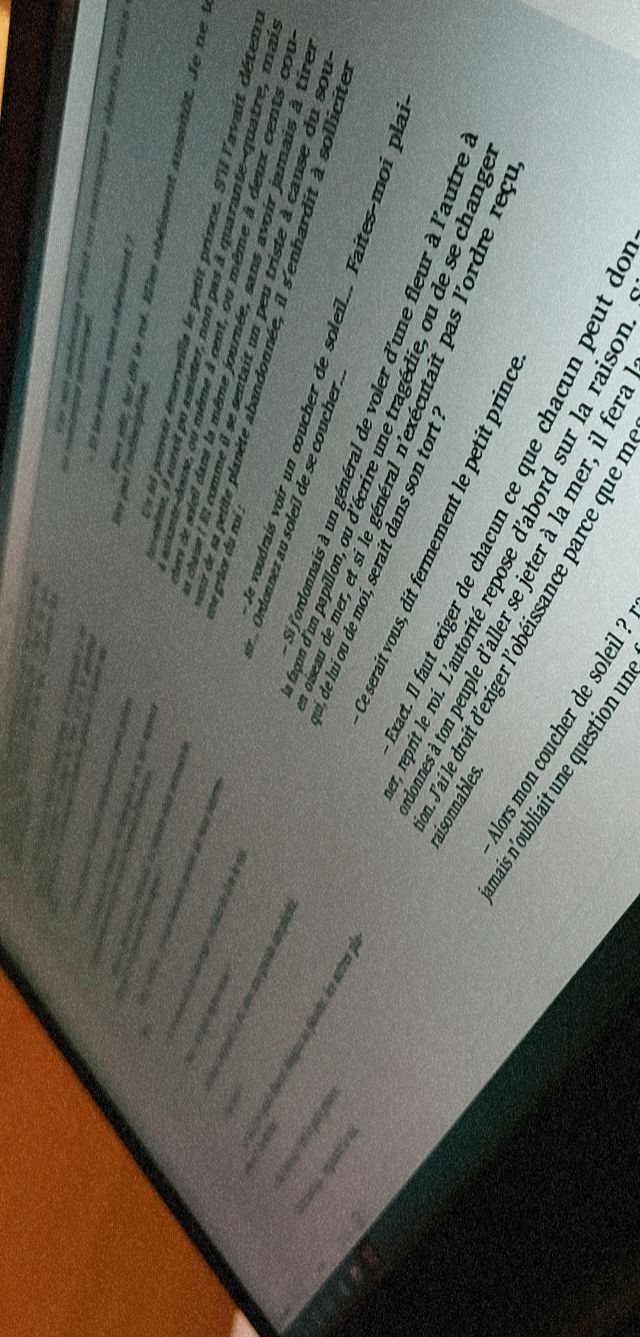
Learning outcomes📚
- Identify owns strengths and develop areas for growth
- Demonstrate that challenges have been undertaken, developing new skills in the process
- Demonstrate how to initiate and plan a CAS experience
- Show commitment to and perseverance in CAS experiences
- Demonstrate the skills and recognize the benefits of working collaboratively
Activity description 📚
I have always enjoyed books, and I have read a lot of them ever since I learned how to read. Exploring new writers, topics, styles or periods is one of my favourite hobbies. I just love how every new text I read teaches me something new, abd each one challenges me in a different way, that I yet have to discover. I love reading everything. I do not mind any form of the book - I sometimes play and listen to audio books, I read in e-form using my laptop or my phone, or I hold a literal book in my hands. Some of the books I read were recommended, or even borrowed, to me by my friends or my family, some I have to read for school, some I bring from the library, and perhaps I was gifted some of them. I read in multiple languages - most of the texts I read are written in, or thanslated to Serbian, my mother tongue, I have read a number of books in English, and recently I read my first book in French language, and I am also preparing to read my first book in German, which I bought about a month ago.
At the moment, I am reading Humiliated and Insulted, written by a russian novelist Fyodor Dostoevsky. Some of the works I have read recently include The Blind Owl, Le Petit Prince, Green hills of Africa, The second Einstein etc.

📚Reflection📚
Reading, in my opinion, is a very benefitial activity or hoby, as it further develops our imagination and encourages the growth of our creative thinking. As we read, we tend to picture all the scenes in our minds, which results in keeping our brain active and healthy. There is another very important thing. As I have mentioned, my friends and I sometimes talk about literature and we usually have recommendations for one another. This way, not only we are discovering new possibilities for reading, we are developing critical thinking and practicing communication skills.
In the picture below, there are some of my favourite books. Even though I like to read everything, more or less - by everything I mean different writers, genres, periods or topics, classic novels will always be my dearest choice. I grew up with some of these books, and all of them had left a great impact on me, so I can never possibly forget them.
Reading, naturally, requires effort, but putting it in is not a problem for someone who looks at books as a kind of passion. There is another challenge that all the readers face, and it is finding time to read something they want. Even though it is sometimes difficult, I try hard to find a few hours each week, that I can spend relaxing with some book, running away from everyday life and all of its problems, obligations and quick temper, and searching for new food for thought.

3 notes
·
View notes
Text
Fyodor Dostoevsky b-day post!

Born on Nov. 11th, 1821, the popular Russian novelist, essayist, short story writer, and journalist Fyodor Mikhailovich Dostoevsky (also spelt Dostoyevsky) was born! His works cover the human psyche in the lower class of 19th century Russia, but don't hesitate to touch upon themes of philosophy and religion. There are so many things about this man that we could cover and so many places to start from; it's almost overwhelming.
Dostoevsky is one of Russia's most famous and widely-read authors, with many of his works translated into over 170 languages and many movies use his books as a basis. His influence didn't only live in Russia; many other philsophers, authors, and famed mathematician Albert Einstein had given their thanks to the novelist. Friedrich Nietzsche had said that Dostoevksy was "the only psychologist ... from whom I had something to learn; he ranks among the most beautiful strokes of fortune in my life."
As a psychologist and philsopher, Dostoevsky incorporates such ideas (i.e. suicide, morality, human manipulation, dreams and their interpretation, etc) into his works and expresses them with great prose and use of polyphony. Traces of Gothic fiction and Romanticism are evident, but not as strong as the realism and existentialism in his stories.
To say that he was a religious man was both an understatement and overstatement (well, it's just a statement then). His family was of the Russian Orthodox faith and Dostoevsky was well accquainted with the Gospel from a young age. Even during his time in military school, he would read from a book of devotions where Christianity was free from dogma and that love was applied to social situations which shines light on the themes of remdemption and forgiveness shown in his books ( and which possibly lead him to an interest in Christian socialism-). During his time in the penal colony, he heavily focused on Christ and the New Testament, writing that he would die with Christ rather than be with the truth outside of Christ. Despite being a pious man, he rarely went to church, had a gambling addiction (but that led to his literary career taking flight), and hated priests; but would talk about Jesus as if he were the best thing since sliced bread (pretty sure that sliced bread wasn't a thing in Russia at the time but ykik).
There's something so compelling about his works. Maybe it's the characters or the bleak atmosphere that most Russian classics have, but we can agree that his mind is an absolute treasure trove. Whenever I read his books, I often find myself wishing to dig around this man's mind. I want to know where all of this truly started. Yesterday, my friend was so excited to tell me that he had bought a collection of Dostoevsky's works in honor of his 200th birthday and that the price was also affordable considering the quality. I was over the moon to hear that because one, I like his writing, and two, I'm glad that my friend took my recommendation.
I have mixed opinions on him. As a person, he was an unfaithful husband and gambler, but as an author, I praise and look up to him. As I have been compared to him on countless occasions , I can't seem to wrap my head around his greatness and how that ties into my own work.
Anyways, happy birthday to this absolute fucking icon of the Golden Age of Russian Literature, it's an honor to be alive in this day and age to enjoy his writing and celebrate his 200th birthday!
Recommended works:
Crime and Punishment
The Brothers Karamazov
The Double
NOTES FROM UNDERGROUND
DEMONS
The Idiot
The Adolescent
Feel free to add your own recs!
#fyodor dostoevsky#happy birthday#russian lit#russian literature#russian classics#crime and punishment#the brothers karamazov#demons#notes from underground#classical literature#literature#russia#books#biblophile#books & libraries#studying#books and literature#european literature#the double
31 notes
·
View notes
Text
Saint&Reading: Fri. Oct., 23,2020
Celebrated on October 10_Julian Calendar
Saint Ambrose of Optina (1891)

Alexander Michailovich Grenkov was born Nov. 23, 1812 in the Russian province of Tambov. His parents raised him strictly and with fervent piety. Since he was of a priestly family, it was no surprise when he entered the Tambov theological seminary in 1830. He did well in his studies and was ranked among the top students.
About a year before graduation Alexander became seriously ill. He promised that if God healed him, he would become a monk. Although his prayer was answered, Alexander seemed to forget his promise.
After graduation from the seminary he took a position as tutor to the children of a certain landowner and remained with this family for a year and a half. After this he became a teacher at the local parochial school.
One day in 1839 Alexander and a friend visited the famous hermit Father Hilarion to ask him what they should do with their lives. Alexander was surprised when he was told to go to the monastery of Optina Pustin, where they had great need of him. In September of that same year, however, he seemed to be prepared to continue with his teaching career.
One night he was invited to spend a pleasant evening with some friends. His conversation was witty and brilliant, and all his jokes and puns were on the mark. Although his hosts were amused and impressed by him, Alexander was disgusted by his own frivolity. Perhaps his unfulfilled promise to become a monk weighed on his conscience.
The next morning he quit his job and arrived at Optina in October of 1839. After a trial period he decided to remain in the monastery and dedicate his life to God. He received the monastic tonsure in 1842, and was given the name Ambrose in honor of Saint Ambrose of Milan (December 7). Ambrose knew the famous spiritual directors Elder Leonid and Elder Macarius. He was the cell attendant of Elder Macarius, who undoubtedly influenced the young monk’s spiritual development.
Ordained as a priest in 1845, Father Ambrose’s reverence and piety in celebrating the divine services were noticed by the other monks. His health began to decline shortly afterward, and he had to ask to be relieved of all duties. In 1846 he was so ill that the Mystery of Holy Unction was administered to him. He bore his illness without complaint and slowly regained his strength. By 1848 he was able to walk with the aid of a cane.
Father Ambrose began to help Elder Macarius with his correspondence and in preparing the Russian edition of Saint John Climacus’s LADDER OF DIVINE ASCENT, which was published by the monastery.
When Father Macarius had to go to Moscow in 1852, he designated Father Ambrose to take his place until his return. Father Ambrose never gave his personal opinions when he was asked for advice, but always referred people to the writings of the Fathers. If someone did not understand the text he was given to read, Father Ambrose would explain it in simple terms.
Father Macarius died in 1860 without naming anyone to succeed him as Elder. By divine providence, all the other possible candidates either died or were appointed as abbots of other monasteries. This left Father Ambrose as the undisputed spiritual director of the monastery. In his role as Elder, Father Ambrose had to receive many people each day to hear confessions and give advice. He used to say, “The Lord has arranged it so that I would have to talk to people all my life. Now I would be happy to remain silent, but I cannot.”
An average day in Saint Ambrose’s life began at 4 A.M. when his cell attendant came into his cell to read the morning Rule of prayer for him. After this he would wash and have some tea, then he would dictate replies to the many letters he received every day. Visitors would be lining up even as he was having breakfast. Sometimes he would take a break after two hours, but more often he would continue seeing people until noon when he had his lunch.

After lunch he would go out into the next room and greet more visitors. People would call out questions and he would give an appropriate response. He took a short rest at 3 P.M. then talked to people until the evening. At 8 P.M. he had dinner then received more visitors until 11 P.M. At that hour the evening Rule of prayer was read, and Father Ambrose begged forgiveness of the brethren whom he may have offended by thought, word, or deed. After three or four hours of sleep it would all begin again. This routine would fatigue a strong man. It is remarkable that Saint Ambrose, who was often in poor health, was able to keep it up for so many years.
From all over Russia, people flocked to the venerable Elder. The writer Tolstoy visited him on at least three occasions, and left impressed by the wisdom of the holy monk. Fyodor Dostoevsky came to Optina in 1878 after the death of his son Alyosha and was profoundly affected by his meeting with Saint Ambrose. The novelist used Father Ambrose as a model for Starets Zosima in The Brothers Karamazov.
The saint founded Shamordino convent in 1884. This convent, which was near Optina, opened its doors to women who were poor, sickly, or even blind. Most convents were very poor and had to rely on the incomes of women who had a certain personal wealth in order to remain open. Saint Ambrose made it possible for any woman who wished to become a nun to follow this path of salvation.
Shamordino began to decline after the death of the first abbess, Mother Sophia. Saint Ambrose went there in June 1890 to straighten out the convent’s affairs. He was unable to return to Optina due to illness, then winter made it impossible for him to travel. Father Ambrose continued to see visitors at Shamordino, even though his health continued to deteriorate in 1891.
By September, it was clear that he had not long to live. He fell asleep in the Lord at 11:30 A.M. on the morning of October 10 1891. Throngs of people attended his funeral and also his burial at Optina. Fathers Joseph, Anthony, Benedict, and Anatole succeeded him as Elder until the monastery was closed after the Russian Revolution.
The Moscow Patriarchate authorized local veneration of the Optina Elders on June 13,1996. The work of uncovering the relics of Saints Leonid, Macarius, Hilarion, Ambrose, Anatole I, Barsanuphius and Anatole II began on June 24/July 7, 1998 and was concluded the next day. However, because of the church Feasts (Nativity of Saint John the Baptist, etc.) associated with the actual dates of the uncovering of the relics, Patriarch Alexey II designated June 27/July 10 as the date for commemorating this event. The relics of the holy Elders now rest in the new church of the Vladimir Icon of the Mother of God.
The Optina Elders were glorified by the Moscow Patriarchate for universal veneration on August 7, 2000.
Saint Ambrose was glorified in 1988 by the Patriarchate of Moscow as part of the Millennium celebration of the Baptism of Rus.
Source Orthodox Church of America
Synaxis of the Elders of Optina
Hieroschemamonk Leo (Nagolkin), 1768-October 11, 1841

Hieroschemamonk Macarius (Ivanov), 1788-September 7, 1860

Archimandrite Moses (Putilov), 1772-June, 1862

Abbot Anthony ( Putilov) 1795- August 7, 1865

Hieroschemamonk Hilarion ( Ponamarov) 1805-September 18, 1873

Hieroschemamonk Ambrose (Grenkov) , 1812- October 10, 1891
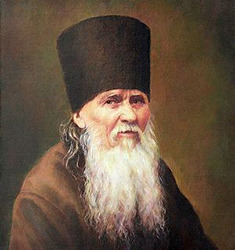
Hieroschemamonk Anatolius I ( Zertsalov) 1824-January 25, 1894

Isaacius I (Antimonov) 1810-August 22, 1894

Hieroschemamonk Joseph (Litovkin), 1837-May 9 1911

Archimandrite Barsanuphius (Plikanov), 1845-April 1, 1913

Archimandrite Anatolius II (Potapov) July 30, 1922

Nectarius (Tikhonov) 1857 - April 29 1928

New Hiero-confessor Nikon 1888- June, 1931

New Hieromartyr Archimandrite Isaacius II ( Bobrakov) 1865-January 8, 1938

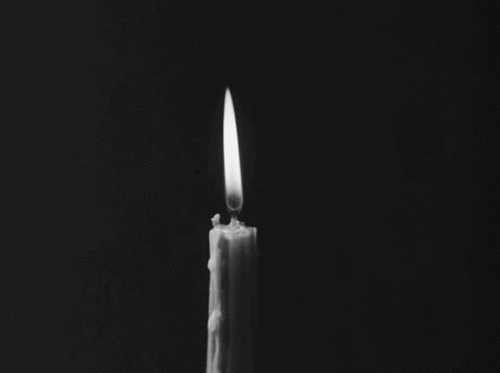

Luke 7:31-35
31And the Lord said, "To what then shall I liken the men of this generation, and what are they like?32 They are like children sitting in the marketplace and calling to one another, saying:'We played the flute for you, And you did not dance; We mourned to you, And you did not weep.'33 For John the Baptist came neither eating bread nor drinking wine, and you say, 'He has a demon. 34The Son of Man has come eating and drinking, and you say, 'Look, a glutton and a winebibber, a friend of tax collectors and sinners!'35 But wisdom is justified by all her children.
Philippians 3:8-19
8Yet indeed I also count all things loss for the excellence of the knowledge of Christ Jesus my Lord, for whom I have suffered the loss of all things, and count them as rubbish, that I may gain Christ9and be found in Him, not having my own righteousness, which is from the law, but that which is through faith in Christ, the righteousness which is from God by faith;10that I may know Him and the power of His resurrection, and the fellowship of His sufferings, being conformed to His death,11if, by any means, I may attain to the resurrection from the dead.12Not that I have already attained, or am already perfected; but I press on, that I may lay hold of that for which Christ Jesus has also laid hold of me.13Brethren, I do not count myself to have apprehended; but one thing I do, forgetting those things which are behind and reaching forward to those things which are ahead,14I press toward the goal for the prize of the upward call of God in Christ Jesus.15Therefore let us, as many as are mature, have this mind; and if in anything you think otherwise, God will reveal even this to you.16Nevertheless, to the degree that we have already attained, let us walk by the same rule, let us be of the same mind.17Brethren, join in following my example, and note those who so walk, as you have us for a pattern.18For many walk, of whom I have told you often, and now tell you even weeping, that they are the enemies of the cross of Christ:19whose end is destruction, whose god is their belly, and whose glory is in their shame-who set their mind on earthly things.
#orthodoxy#orthodoxchristian#ancientfaith#originofchristianity#holyscriptures#gospel#sacred texts#spirituality#wisdom
2 notes
·
View notes
Text
Cold War (2018) | Directed and Written by Pawel Pawlikowski
Before getting into Cold War, as a prelude, I’d like to mention a funny documentary the filmmaker Pawel Pawlikowski released back in 1991 called Dostoevsky’s Travels. It follows the great-grandson of the famous Russian writer Fyodor Dostoevsky who died in 1881. Fyodor is generally known as one of the greatest writers of all-time and possibly one of the first modern psychologists, deeply probing the human soul in his work.
Great-grandson Dmitri drives a tram in Leningrad, Russia and agrees to go on a speaking tour about his “prophet” Grandfather. He doesn’t do this to pay his respects, but only because he dreams of scraping together enough money to buy a used Mercedes to impress his friends. And he is OBSESSED with buying a Mercedes and knows nothing about his Great-Grandfather.
He talks to crowds of intellectuals and hardly has anything to say about his kin Fyodor and just wants to get paid. He buys one Mercedes and it breaks down immediately. He then buys another at the end of the documentary and it gets stolen by bandits. As the doc progresses you see Dmitri is a bit of a numb-skull and a scoundrel.
I liked it due to the irony of Dmitiri’s complete uncaring attitude towards Fyodor’s highly regarded esteem, and obviously this absurd infatuation with acquiring a used car as a status symbol compared to his novelist grandfather, who is held up so highly for his spiritual profundity and depth.
It’s a great piece of work no one has heard of...part-cautionary Capitalist tale at the end of the Soviet Union, while Cold War is part-cautionary Communist tale post World War II.
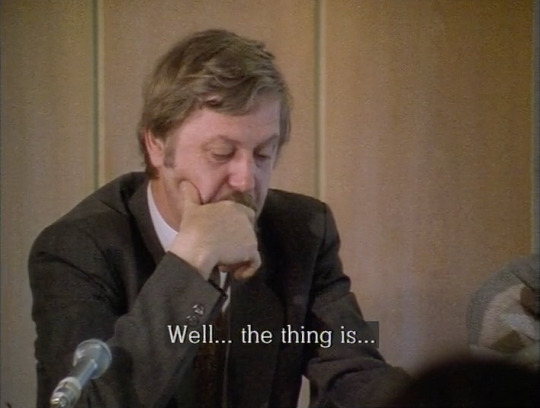
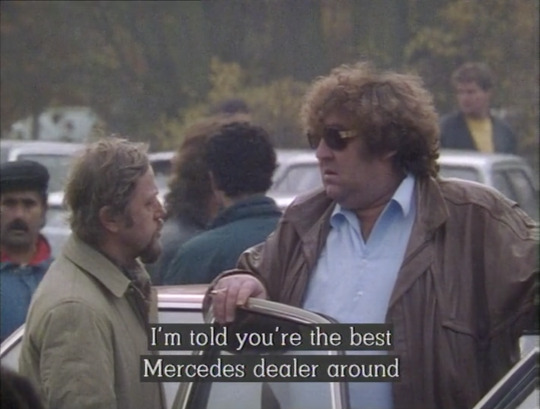

Official Trailer for Cold War
youtube
Intro and Technical Specs
To start, my main fear of writing about films I love is that it will suck the joy out of the film itself by looking at it so closely. I have only written in depth about two films, and thus far, am finding it to be the opposite. When going under the microscope, I am just becoming more aware how great a truly well-made film is when breaking it down.
Cold War may be the most beautiful black-and-white film I’ve seen. The category Amazon has placed it in is “Arthouse Drama”. Amazon Studios also is the distributor of the film. My guess is because it did very well at the Cannes Film Festival and Pawlikowski won the Oscar for his previous film Ida in 2013. Sometimes they get it right.
To give some more context, I am very familiar with Ida and studied it for research for making my latest short film. I found it interesting Pawlikowski implemented a particular style similar to filmmaker Paul Schraeder’s book, “Transcendental Style in Film”. One aspect of this style pertaining to Ida is the cinematic framing for the action and not moving the camera until the end. He framed his subjects in a squared 4:3 aspect ratio while leaving lots of headroom, sometimes leaving them in the bottom corner of the frame, which carried over to Cold War. I don’t exactly know why he does this, but I have some theories that I will flesh out within the post in depth.
While watching, I immediately noticed the grain in the 4K version. I looked it up and the film was shot with an Alexa digital camera and also a 35mm film camera, so apparently they were able to mimic film grain with the Alexa in post to match. A 32mm lenses was used for almost all the shots. According to Pawlikowski it was because this focal length closely mimics the viewing width of the human eye and allows a wide space of action that can fit around the subject(s) in the frame.
Similar to Ida, there is no non-diegetic music in the film (music added outside of the film’s music itself) until the closing credits, reminiscent of the French director Bresson.
Opening in Rural Poland

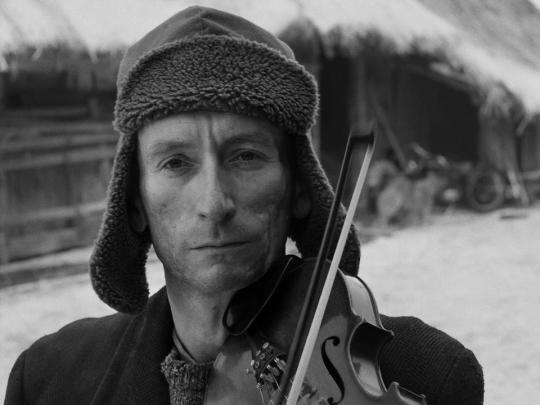
The film opens on the hands of a man playing an instrument that resembles bagpipes, looks handmade and I assume is indigenous to Poland. The camera tilts up to reveal a bright-eyed rural man, and eventually pans over to another interesting looking character playing a violin as they sing together.
We soon learn that Wiktor (one of the protagonists) is traveling with two others (Irena and Kaczmarek) and they are recording various forms of folk music unique to the Polish people. Kaczmarek immediately degrades this type of music as “possibly crude” or “too primitive” immediately marking a divide in perspective compared to Irena and Wiktor, who visibly enjoy interacting and recording the villagers’ authentic music.


They soon come to a house where a unique-looking dirty village girl sings a song not accompanied by any instruments. She has deep-set eyes and looks slightly haunted, and the lyrics of the song are about unrequited love.
Not a happy song.
Wiktor and Irena are enraptured by the raw singing and are recording this. In contrast, Kaczmarek disinterestedly eats soup in the next room, spoon klanking against the bowl, probably interfering with the recording.
Kaczmarek is representative of the Communist State for this film, high on bureaucracy and lacking in soul.
The song being sung by the little girl is a huge part of the film as a whole. Little do we know (and probably not evident to most who have seen the film) the lyrics tell the story of what happens between the protagonists we are about to follow in the film. The song is called Dwa Serduszka (Two Hearts) and is an authentic Polish folk song like much of the music in the movie.
After watching for the first time (I commonly do this) I went online to look up background information and found a very well-made youtube video essay describing the song as being the “Leitmotif” for the film. Leitmotif is a term defined as “a recurrent theme throughout a musical or literary composition, associated with a particular person, idea, or situation”.
In this case, the song operates as a direct pointing of what is to happen. The song pops up several times throughout the course of the film, forecasting the fates of the two protagonist lovers, Wiktor and Zula, who are brought together by music.
This “forecasting” I believe goes deeper. It’s as if it is pre-determined. Pre-determined due to the current political environment in Poland and the two characters’ difference in personality and upbringing. Also, most importantly, is because they love each other in a way that seems beyond their control and not a choice, eventually becoming impossible for them to live life without one another. The leitmotif reminds us throughout the film of Wiktor and Zula’s inability to escape their fate, which is already etched in stone by powers beyond their will:
Two hearts four eyes
Crying all day and night long
Dark eyes, you cry because you can't be together
You can't be together
My mother told me
You mustn't fall in love with this boy
But I went for him anyway and love him until the end
I will love him until the end
youtube
Folk Ensemble
Now we are at a large building which looks to still be in the rural area. Auditions are going to be held here for singers and dancers for a folk ensemble performance. A couple of trucks haul the commoners in and Kaczmarek gives a stately speech to the bunch before cutting inside to everyone waiting to audition for Wiktor and Irena.
We then meet Zula waiting. She elects to audition with another girl, naively, rather than shine in the audition solo. They enter the room to sing for Wiktor and Irena. Wiktor is immediately transfixed and asks Zula to hold on and asks her to sing another song alone.
She sings with an authentic, untrained beauty. We also see her feistiness here. It’s obvious Wiktor is smitten and she is marked down to be selected as one of the singers after they exchange a parting look.
By now, the framing style of the cinematography is noticeably unique compared to other films. As mentioned in the intro, characters are often framed with lots of headroom and sometimes placed in the bottom of the frame, leaving it mostly open space. My theory on this is that the environment the characters inhabit are shaping their destiny more than the characters’ own free will, therefore their heads are often seen at the bottom with action on top and around them.
For example, Communism looms larger than the individual, tamping he or she down (literally) to the bottom of the frame. Not only Communism, but their uncontrollable love for one another, the characters’ upbringing and the people around them with their general wants and needs. These factors shape their present and future more than their own willful, self-determination and I think the filmmaker is aware of this fatalism, yet doesn’t just come and say it because that wouldn’t be interesting. We just see that Wiktor and Zula are never able to comfortably settle anywhere with their love nor escape the love they feel for one another, making their situation impossible due to the circumstances.
In Ida, duty to God looms large and so does the characters’ Jewish unknown family past (to only name two) and the shots are framed accordingly as well.
On a broad level stepping outside of the film, what’s interesting to me is how much free will do humans actually have and how much is self-determinant? After studying the film closely, this is the deep question (not answer) that I came to that transcends the surface story.
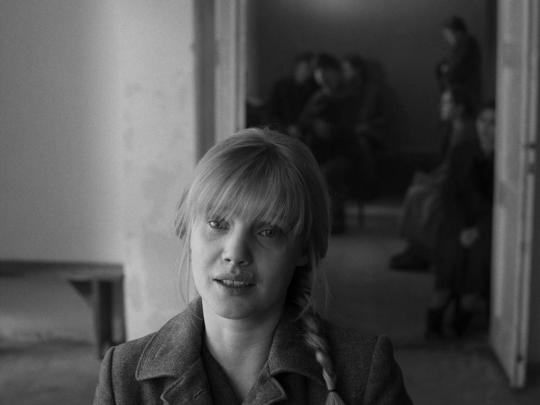
Wiktor watches Zula from a distance outside that evening. Irena then tells him Zula killed her father and did some prison time for it. After rewatching, I suspect that Irena loves Wiktor, and there are a few subtle cues later on that I noticed as well.
During private lessons, Wiktor curiously asks Zula what happened between her and her father while Wiktor plays scales on the piano and she matches the notes with her voice. Zula says her father tried to be sexual with her so she stabbed him. It is a very matter-of-fact and short answer. Wiktor doesn’t say anything and continues playing the piano.
I’ve thought about this scene more so than any other scene after rewatching. I think it is because of the dialectical nature of Zula saying she stabbed here Dad because he tried to have sex with her, one of the darkest things you could imagine, then the slight humor of Wiktor’s reaction while seamlessly transitioning back to the softness of the piano and her soft voice syncing.
Wiktor is very watchful, internal, reserved, most likely from a more refined family and musical background. Zula is tough, spirited, tenacious and has lit a fire in Wiktor. Wiktor is tall and dark-haired. Zula is short and blonde. Opposites!
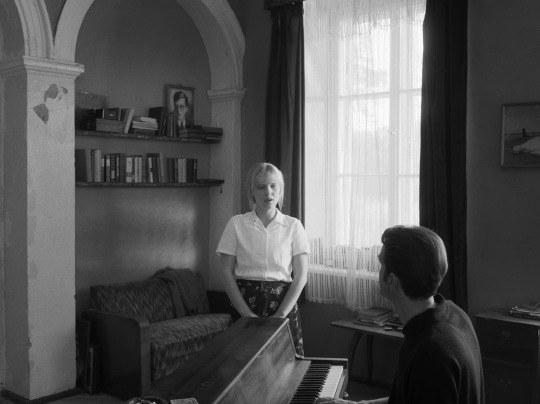
It is now time to perform for a large audience in a theatre. Wiktor conducts. Zula and about 20 other girls in Polish folk attire sing the leitmotif song that was sung by the young girl earlier. The group sings beautifully. Zula shines in front. Even Kaczmarek on the side of the stage behind the curtain seems to be in awe and carefully walks about as if not to disturb the magic.
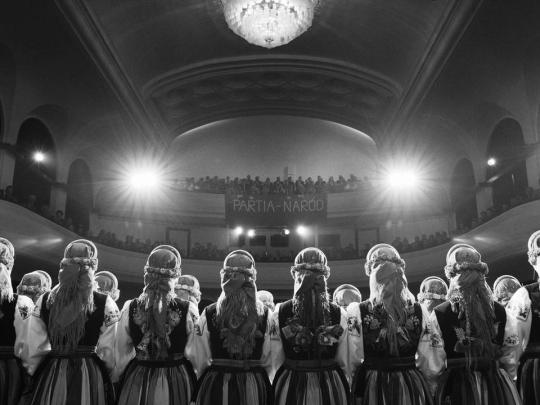
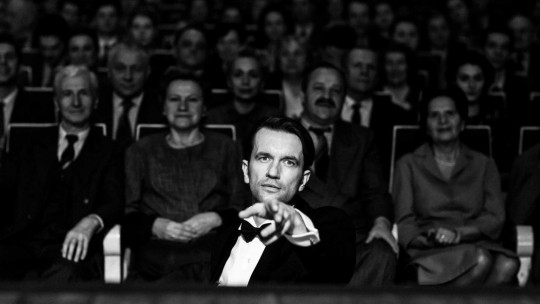
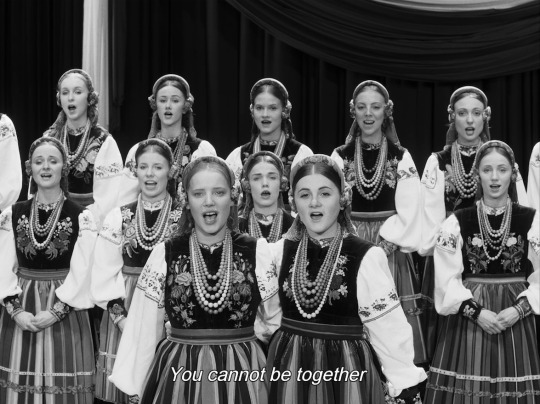
Afterwards there is a reception. Wiktor and Irena lean against a large mirrored wall and everyone else in the room is seen in the reflection. When you first watch it, it takes awhile to figure out the orientation of the room due to the mirrored wall. I think this is the most interesting shot of the film.
Kaczmarek then gleefully enters frame and says that the performance was so beautiful, calls Wiktor a genius and says it’s the most beautiful day of his life. He really means it and is the most authentic emotion we see from him in the whole film. Previously, Kaczmarek thought all this “folksy stuff” was foolish. There is a funny moment between the three. Wiktor and Irena are obviously moved by this but not sure how to express it as the stately Kaczmarek leans against the mirror with the two.
On a second viewing, one sees Zula in the reflection staring at Wiktor the entire time.
The two make love soon after in a bathroom at the party.
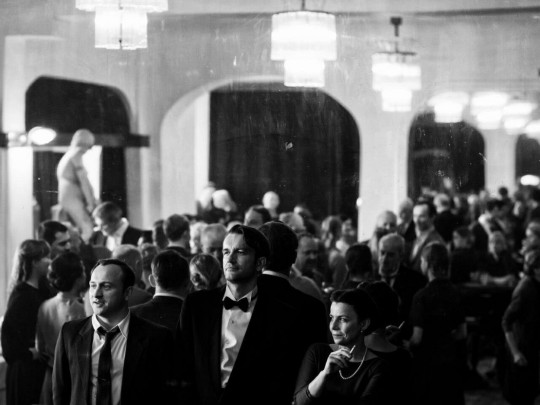
The Ensemble + The State
The performance is so good, now the State wants to get involved and meets with Wiktor, Irena and Kaczmarek. The government wants to turn the repertoire into a “calling card for our Fatherland” and incorporate “Land Reform”, “World Peace” and a strong number about the “Leader of the World Proletariat”. In return the group will be held in high favor, able to travel to other countries to perform, etc. Irena and Wiktor are visibly uncomfortable with this. Irena speaks first and says thank you but the ensemble is about authentic folk art and the rural population doesn’t sing nor understand these difficult issues. Kaczmarek quickly intervenes and calls the man from the state “comrade” and says the ensemble, on the contrary, will do this after given proper direction. Irena stares him down. Wiktor says nothing.
The next performance is stained by a huge tapestry of Stalin behind the singing ensemble. The tone now is more dutiful rather than soulful, as if singing a church hymn they are forced to sing. Zula’s face while singing now lacks the life it possessed in the performance before. The State must extinguish all individuality and uniqueness with the goal to homogenize. Irena’s heart looks broken in the audience. Everyone dutifully rises for applause afterwards and Irena walks out. We do not see her again in the film. Everything has changed.
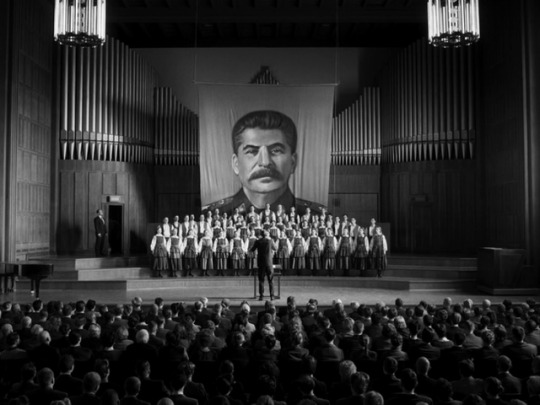

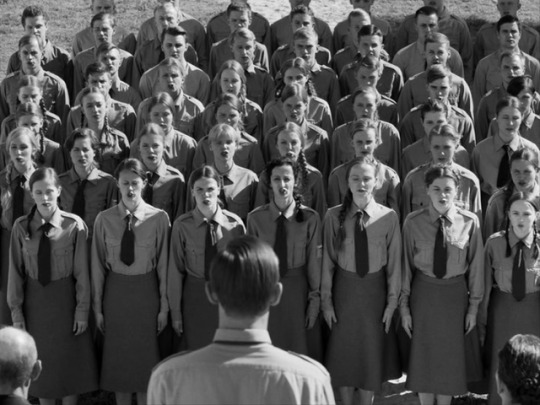
The stuffiness of the singing troops is saved afterwards by a beautiful shot of Wiktor and Zula laying in a golden wheat field together at dusk. Golden?? The film is in black and white but my mind says “golden”. Birds and crickets sing.
Tranquility away from the group.

But it doesn’t last long, as they are unable to run from the larger outside factors. Zula soon confesses that she reports on Wiktor to Kaczmarek about their relationship and the things he tells her. She says it’s because she’s on probation for something and assures Wiktor that it’s nothing that will hurt him, but Wiktor gets up and walks off angrily at a loss for words.
As mentioned, the scene starts with their eyes closed as if in a dream, beyond the State, but it's inevitable that the state has to enter their relationship at some point, infecting the dream, and will remain a problem for the rest of their lives.
Zula calls him a “bourgeois wanker” as he walks away and she reacts oddly by jumping in a nearby river. As soon as she hits the water, Wiktor stops and turns around. She floats in the river and begins singing the leitmotif song.
The next shot is of the two silently sitting together again in the wheat field at nightfall with a campfire going. Zula’s hair is wet. The two just stare at each other and never say a word.
What are they thinking?
I think Wiktor is thinking that he can not escape her because of his love and that they are stuck! Zula knows this too. This is a type of love that transcends choice. Just like the State, their love controls them.
The silent shot in nature cuts to black, then diverges to a busy train station with a brass band as the ensemble leaves to go to Berlin for a show. Kaczmarek gives a stately speech to the group about their trip. Wiktor meets Zula privately in a train car and lays out a plan for their escape once in Germany to go to France. Zula is nervous she will not be able to make it somewhere other than her homeland Poland due to her inability to speak French and lack of experience. I doubt she has any family to rely on, and at the moment has the ensemble in Poland as a decent occupation. Wiktor assures her she has talent to learn and the most important thing is they’ll be together. They kiss.
The performance in Berlin is shot very uniform and proper, perhaps further pointing to its newfound soulless rigidity. Afterwards, Wiktor goes to the meeting place to cross the border. Zula remains at the reception with the comrades and Kaczmarek (as if in a trance) and never shows. Wiktor waits until nightfall and eventually stiffly walks across without her.

Defection
Wiktor is now playing piano in a cool jazz night club in Paris with a band. It is 1954. His beard is now grown out a bit and his hair messier than before.
He is now in an empty cafe at closing time and speaks French with the waitress. He seems to have assimilated well here. It is revealed he is waiting for someone. That someone is Zula. She eventually walks in and they stare at one another for a few moments.
One look at Wiktor while sitting across from her shows how much he still loves her and has missed her. The actor playing Wiktor, Tomasz Kot, really shows this wonderfully. He is very good at being still yet showing so much. Regarding the performances, this is one of the most authentic love films I’ve seen in a long time. And an expert director and writer doesn’t hurt. The film never feels sappy, in my opinion, while simultaneously remaining very romantic.
Zula doesn’t show much and stays cold during this scene, but can’t help but ask, “Are you with someone?”
Wiktor is.
So is she.
He asks if she’s happy.
She isn’t, but doesn’t say it.
Wiktor knows and walks her to the hotel.
She says she wasn’t good enough, not as good as him, to make the escape from Poland to Paris.
Wiktor says he believes love is enough.
Zula coldly kisses his cheek and then stolidly walks away.
Wiktor watches her go.
But eventually Zula breaks! She turns back around, walks quickly back and they kiss passionately for a few moments before she leaves again.
If one just read this and didn’t watch the film, you might think it seems like any other love story you’ve seen a million times. But to me, because of the authenticity of the performances and lack of constant soundtrack music, it really felt great to see these two embrace again. And I think it proves that moments in movies that may look cliche on paper can be pulled off with a skilled filmmaker and actors. Also, there’s only a few angles that the camera covers in this scene and ALL the scenes really! There’s a graceful economy and no superfluous closeups with unnecessary dialogue. And as mentioned, no outside music booms in like most films commanding you to feel something! You feel it because you feel it, not because you’re told to feel it with an over-bearing soundtrack trying to compensate for lack of performance or direction.
Wiktor now walks into his apartment, smokes a cigarette alone deep in thought, then gets in bed with his girlfriend. He tells her he’s just been with the woman of his dreams. She doesn’t seem to care and turns around to go to sleep, highlighting the lax and blase nature of their relationship and possibly Paris artist life as a whole. Wiktor then turns off the lamp and looks up at the ceiling in lovestruck thought.
We are now in Yugoslavia in 1955, which looks much more lush than I would’ve imagined Yugoslavia. Wiktor gets off the train to attend a performance of the ensemble. Kaczmarek quickly greets him at the front of the theatre and is oddly cordial and confident in a sharp suit.
Once inside, Zula sees Wiktor in the audience and looks startled.
Wiktor looks side to side and men are watching him from the aisles. He is escorted away by authorities yet remains adamant to see Zula rather than be afraid of being thrown in jail or hurt.
The first time I watched I thought he was definitely going to be thrown in prison. Kaczmarek obviously ordered the men to take him away and send him home in a train before he could see Zula, because of Kaczmarek’s interest in Zula.
Zula and the ensemble are shown singing the leitmotif song now. Zula notices Wiktor is no longer in his seat. Perhaps he was escorted out at the intermission. She sings with a melancholic intensity. The black-and-white contrast is especially beautiful here, maybe more so than anywhere else in the film. There is a black back drop and all of the singers’ alabaster skin glows, as well as their folk costumes.
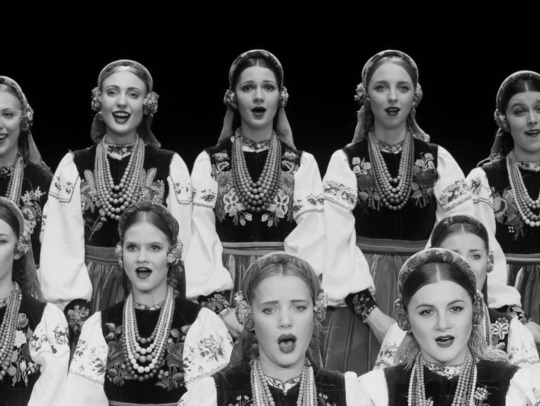
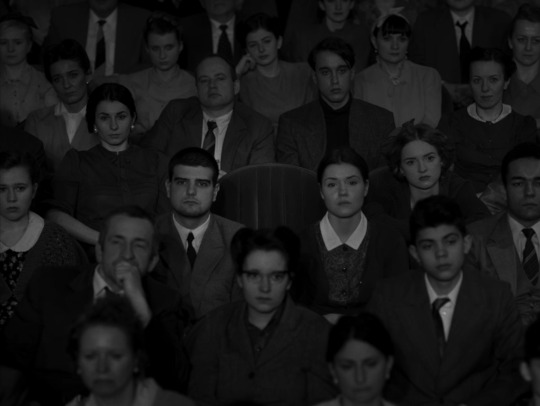
Wiktor is back in Paris now and has gotten work as a Film Composer. Two years has passed since the Yugoslavia concert. While in the middle of working on the soundtrack, the side door of the sound stage opens. Wiktor is spellbound as a smiling Zula is revealed.

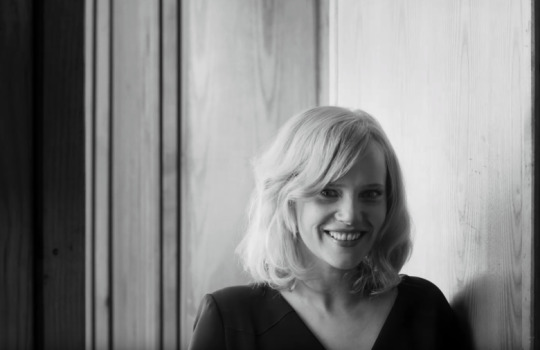
Zula has married an Italian so she could legally move to France. She says the marriage doesn’t count though because it wasn’t in a church. Neither seem worried about it. This time Zula does not hold back her feelings and, obviously, neither does Wiktor.
They make love.
They ride on a boat down the Seine at night past the buildings and cathedrals. They messily and drunkenly dance alone at a night club in rapture.
Heaven for a moment.
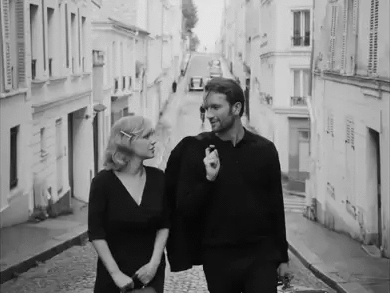

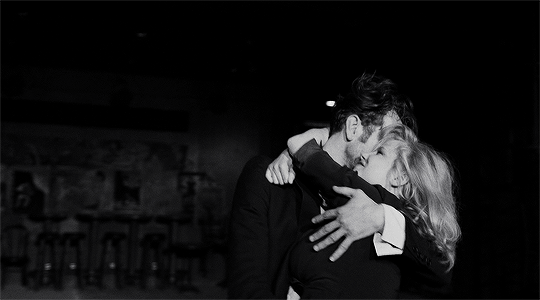
Which begins Zula’s vast transition from the performing rural ensemble in Communist Poland to a solo singer at the Paris jazz club with Wiktor’s band.
She sings the emblematic Dwa Serduszka most wonderfully here.
Order. Everything in it’s right place.
She is luminous as the camera slowly dollies around her, eventually revealing a packed club. Everyone is captivated and still. Then at the end is a lovely moment, maybe my favorite moment of the film, where Wiktor is staring at her intensely and she turns to check in with him and he gives her a nod of approval. It’s almost corny, riding the edge, but is powerful, conveying a silent understanding between the two seeing one another perfectly clearly.
Poles to Parisians
We now are at where Wiktor and Zula live, which looks like a cool version of a converted attic with a Paris view. Juliette, Wiktor’s ex, has translated Dwa Serduszka from Polish to French and Zula is unhappy with the translation, which most likely includes some self-consciousness about her pronunciation. The manner is which the leitmotif song appears here runs parallel to the first step in the descent of the relationship in Paris. Zula is defensive and anxious about the Parisian artistic circle Wiktor has introduced her to and she drinks to ease the anxiety of feeling inferior. Wiktor tells her not to because she is “charme slave” as they say, alluding to how everyone has a narrative role and label in these circles. Zula is becoming difficult and insecure. Wiktor is becoming caught up in the scene and ignorant of Zula’s dramatic change of environment.
The film director at the party looks Zula up and down when they arrive. Wiktor allows this without rebuke, most likely due to the nature of the sexually-lax Parisian art culture. Everyone is beautiful and chic at the party. Zula immediately goes for the drinks. She then sees Juliette and approaches her abruptly (yet with restraint for Zula), subtly challenging her French translation of Dwa Serduzska. Juliette calmly explains her reasoning according to the lyrics’ metaphors. It’s obvious Juliette sees through what’s happening in the situation here.. Juliette’s part is small but the actress is excellent and conveys a lot. She eventually mentions how the transition to Paris must’ve been a shock...the cafes, cinemas, shops, restaurants. Apparently Juliette sees this shock more than Wiktor does. Zula tries to play it cool here but you can see she’s flustered. This is a game she’s not used to playing. She then retorts that her life in Poland was better.
Wiktor is talking to someone and looks over and sees Zula and the Film Director sitting closely, flirting. Zula glances back over at him to see if he cares, but Wiktor stays put. Then later she aggressively confronts him about giving her story “more color”. It is apparent now that he has enhanced her Polish story to seem more dramatic in order to captivate his French friends and colleagues. Wiktor shrugs this off. Zula’s vibe is not carefree and cool like the rest of the party with her straightforward, intense rawness which creates an isolation for herself.
She sits in the bathroom now alone, drinking from a bottle, talking to herself in the mirror. She calls Wiktor a jerk, but then says she loves him. She calls herself an idiot at one point. She continues to talk in the mirror as if to console herself. And I can’t help to mention how much she looks like a young Gena Rowlands here. It reminds me of the 1968 film Faces, which is also black and white. They look so much alike, and both fantastic actresses that are blonde, voluptuous and troubled.

Gena Rowlands in Faces (1968)

Joanna Kulig in Cold War (2018)
Wiktor, unknowingly and excitedly, opens the bathroom door and says that they’re all going to the Jazz Club now. Zula says she’s a bit sad and wants Wiktor to come in the bathroom with her, but he ignores this and says let’s go. She takes a moment to herself and then it cuts to the club.
She looks miserable and wasted sitting at the bar. As we go, I am still noticing the framing I mentioned at the beginning with the subject at the bottom, but for this shot she really seems low!

Her melancholy is interrupted by an upbeat, American song (”Rock Around the Clock Tonight”) and she gets up reinvigorated and starts dancing enthusiastically with a few different guys. The camera goes handheld and is the messiest camerawork of the film (a good messy). She eventually gets sloppy and gets on the bar and almost falls and people drunkenly cheer as Wiktor exasperatedly watches.
youtube
We then see Wiktor carrying her into their room. Zula says he is no longer a man in Paris like he was in Poland, and says she and the director get along well in attempt to get under his skin further. He then sits alone in the dark and smokes a cigarette.
It now cuts to Zula in a sound studio singing into a mic in French. I don’t speak any French, but her accent and pronunciation feels correct, but her spirit is muted...and we soon see one reason why. Wiktor’s voice ominously interrupts her over a speaker behind glass in the recording booth. Now the shot is on him and he looks disheveled and dark and tells Zula they only have 40 minutes left and not to blow it. There is a deep hate in his eyes we haven’t seen yet, perhaps retribution for calling out his manhood and their recent relationship woes. An engineer and the film director are also in the booth. There is just a bad energy in the room and anyone that’s ever tried to perform anything would be able to detect how difficult it would be to bring a great performance here. The music starts back up and Wiktor looks down as if disappointed right before she starts singing.


We are at a listening party now for Zula’s record at the French Director’s apartment. Zula is standing in the middle of the room alone, listening intently as several others sit around in the background drinking champagne. Dwa Serduszka plays, but now in French.
It’s okay but not great.
It doesn’t have the soul that it had before in Polish.
I’m trying to put my finger on it, but the French seems a little stiff and the vocal track seems extra-produced. Too loud and too clear when mixed with the band’s instruments and it’s just not what it was before like the first time at the jazz club, for example.
Again, this leitmotif song is also a metaphorical indicator for the stage in the relationship. She looks over at Wiktor who is cooly leaning on the wall off to the side (maybe too cool) and gives Zula a nod similar to his nod after the jazz club performance. But this nod doesn’t have the effect it did then and seems oddly forced. The record playing here in this posh Paris apartment compared to the Polish rural girl singing at the beginning of the film is night and day. It’s obvious why, if you think about it. They’ve taken a folk Polish song, translated it to French for a rural Polish singer, then recorded and produced it in a slick Paris sound studio under difficult conditions. How could the quality not suffer a bit?! Another example of the larger outside obstacles making it impossible for them, even in a free society like Paris, France.
It cuts to them now walking home afterwards. Immediately it’s apparent Zula is unhappy. Wiktor recognizes this but apparently didn’t know while at the party. As they pass a fountain next to the street, Zula throws the record in <splash> yet continues to mostly hold her sadness in, which has become more of a depression at this point. Assimilating is one thing, but they have gotten into this habit of holding back and not being up front, maybe due to the social circles they run in now. Zula cooly mentions that the French Director has fucked her well 6 times and "not like a Polish artist in exile,” which causes an eruption in Wiktor (what she wanted) and he slaps her.
This is strange to mention but, technically, the slap doesn’t sync with the sound. Lol.
I watched this part 3 or 4 times to make sure and it just doesn’t (unless there was a lag in the internet connection). Maybe nobody else notices this, but I’ve had to edit-sync slaps, kicks and punches before many times on this very computer and immediately saw something didn’t look/sound right.
After the hard slap, Zula raises up and says, “Now we’re talking”, which is sarcastic but also the truth. Often one needs a crisis moment to break out of a behavioral habit and apparently the French translation broke the camel’s back.
The next day Wiktor frantically goes to the Director’s apartment looking for Zula. He stomps through the rooms looking for her. The Director then says she went back to Poland. Wiktor slowly walks out of the apartment with a terrified look on his face.
Wiktor has become unhinged and plays maniacally on the piano at the Jazz Club. The other band members just stop playing and look at him as he bangs on the keys in isolation. There is some slight comical levity here for a couple of seconds due to the look on the clarinet player’s face.
You assume Wiktor has lost his job. He is now miserably pumping coins in a phone booth for talk time to find out where Zula is in Poland.
Afterwards, Wiktor goes to what I assume is an embassy. A Polish man at a desk tries to dissuade him from leaving Paris and going back to Poland. You can see the Eiffel Tower outside the window as the man asks Wiktor why he would ever want to leave this place. He says Wiktor doesn’t exist anymore to Poland because he left and let down all the young people he worked with. The man takes a drink from his cup and reacts as if he’s spiked it with something strong, perhaps how he’s able to get through his job. He then mentions there is a way Wiktor can go back if he truly regrets what he has done.
The Exiles Return

It is 1959 and we see Zula back in Poland on a dreary, crowded train with peasants. Soldiers whistle at her as she walks on a snowy road. She has come to visit a very broken, gaunt Wiktor who is being held prisoner by the military for being an exile. He says he has to be here for 15 years and got off lucky. Zula gives the guard what I assume are cigarettes which buys them 10 minutes alone.
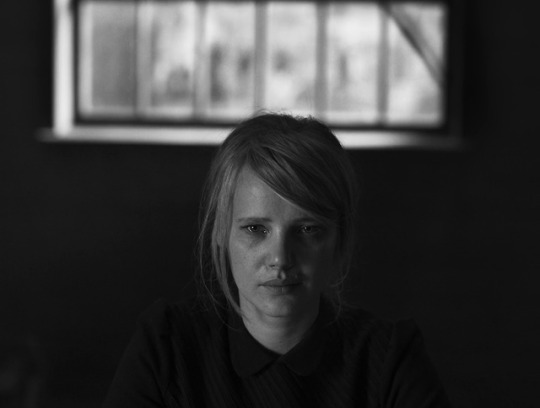
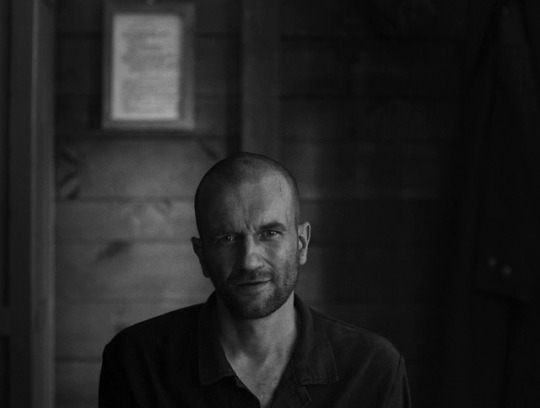

His right hand has been beat severely. They kiss and Zula says she will wait for him. Wiktor tells her to find someone else, but Zula says she will get him out.
Cuts to 1964, 5 years later. A performing Zula is on stage singing a ridiculous Latin-infused song with a black wig on, resembling a late Judy Garland. She looks overweight and drunk with her comical, sombrero-wearing band.
We now see an older Wiktor backstage with Kaczmarek who is holding an unhappy, despondent child. Kaczmarek doesn’t look like he’s aged a bit and still has a detached soullessness about him. With Kaczmarek, you wait for him to be rude or mean but he is not. He always stays at a steady, robotic hum of cordiality.
It is revealed Wiktor can no longer play music because he can no longer use his right hand. It is also now apparent that Zula married Kaczmarek in order for Wiktor to be released.
Zula now comes off stage and walks quickly toward them but drunkenly falls down. She manages to rapidly get up and falls directly into Wiktor’s arms, completely disregarding Kaczmarek and her son.
They go off to the restroom together and sit on the floor staring at one another. Zula pulls off her wig, perhaps finally able to shed this horrible identity she's had to create to survive.
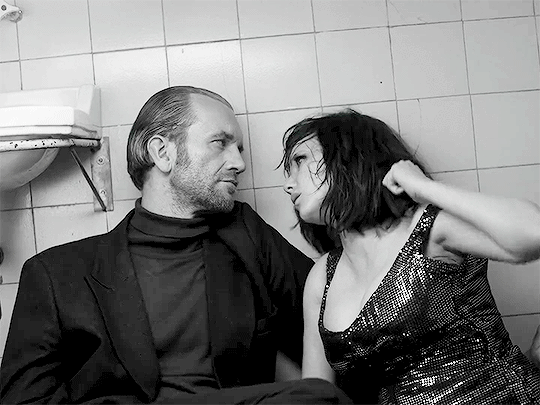

She asks him to get her out of here...for good.
The two take a crowded bus and get dropped off on a country road next to a lovely field. They look slightly rejuvenated but stolid.
Early in the film, Irena and Wiktor sat in the van while Kaczmarek took a walk to take a pee. Kaczmarek then aimlessly walked into the ruins of this old church. He looked around, then left...point being we’ve seen this place before. And earlier, even Kaczmarek’s face showed a certain amount of reverence for this old church and felt the power it gave off.
Wiktor and Zula now enter this same church. There is a circular hole in the ceiling, perhaps so God can see them.


They now kneel with a candle lit in front of them on an alter with a row of white pills. They have a brief, simple marriage ceremony. They both have a glow to them. They cross themselves and mention God. They ingest the pills.

They kiss.
They then sit on a bench at dusk and look out into the field, holding hands, quiet.
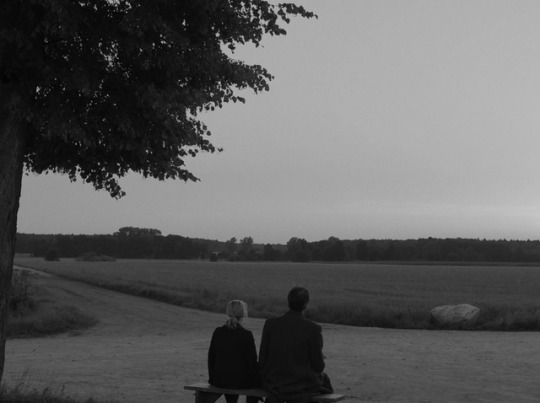
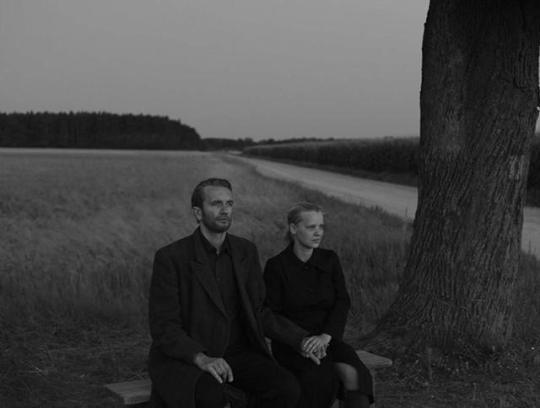
You can hear the insects and an occasional bird chirp. Both have dark circles under their eyes. It’s so beautiful yet so sad.
Zula then says, “Let’s go to the other side. The view will be better there”. They stand and go, leaving an open frame. A gentle gust blows the wheat from behind where they were sitting. Perhaps God’s sigh...
This last time I watched, the ending really got me...and is powerful now as I write about it.
As mentioned in the intro, Pawlikowski’s last film Ida incorporated a particular style. Pawlikowski never moved the camera until the end of that film, so when he did the viewer would be raised up in a transcendental way as the first external music came in, lifting us from the real world for a few moments. I think he did the same thing here with Cold War in a different way. The moment of transcendence for this film comes at the end also but not with the movement of the camera but with the movement of the wheat behind the bench before cutting to black. This film is high on realism, but this gust is something otherworldly, therefore a powerful contrast from the stark, real world tribulations previously in the entirety of the film up to this point. This is what makes it so heartbreaking and beautiful and poetic all at the same time. And also, for a moment, the viewer might weigh whether the fate of Wiktor and Zula is so horrible after all.
“for my parents” appears before the credits, pointing to the fact that the story is based on the filmmaker’s parents’ true experience during that time period. Bach’s Goldberg Variations comes in and you know it’s Glen Gould when you hear the humming, which I don’t necessarily like but it doesn’t ruin the mood. Bach was also used for the ending of Ida and is also the only non-diegetic music used for Cold War.
In conclusion, I think every great film has to have a surface story that one can follow and then a large idea hidden within that story (or as a result) to meditate on which includes something deep about the human condition. With some films, one has to work to find out what that larger idea is. For future posts, I may try to specifically focus on this “larger idea” rather that breaking down the entire film. This often appears as a question, not an answer, and Cold War does this masterfully.
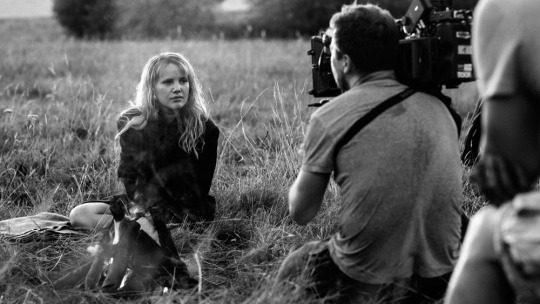
3 notes
·
View notes
Text
It’s good writing not to just give away the punch line right from the start. I’ve tried to become a better blogger by reading a number of writing guides and essays for post format. They suggest vague titles that give you a good idea of the content but don’t give away too much. Your posts are supposed to build up to something then end on a punch. You want to give your readers a reason to keep on reading so the payoff has to come at the end.
Don’t just show your hand right off the bat. And all I have to say about My Ill Deeds Are the Work of God (the episode’s title in case you’re confused), is dayum….
I never learn
As has been pointed out by astute readers, so far I have had a marked weak sport for the episode arcs of Bungo Stray Dogs which are based on Light Novels rather than the manga proper. It’s not that I don’t like the main storyline, I obviously do, but the mini arcs have been more satisfying for me, so far. This is why I wanted that opener to last as long as possible. Nevertheless, I was looking forward to the main action of this season.
Not that many of you read these reviews, and I assume less bother to go through the comments, but those who have know that I was eagerly looking forward to Dostoyevsky’s grand entrance. This is not just some national kinship between russians and surprisingly it’s not entirely due to my appreciation of the character design either. Rather it has to do with the myriad of connections between Bungo Stray Dogs’ narrative and the real world counterparts of the characters.
I have no clue who Ace is suppose to be
This anime has led me down a rabbit hole of classical literature and authors biographies like no other. I thought for a while of creating a post entirely on the subject but instead, I’m going to pepper the easter eggs I particularly like in my reviews, whenever pertinent. And the reason I was looking forward to this season is because of the novel No Longer Human.
No longer Human is the name of Dazai’s ability. It is also the best known novel of the real world Osamu Dazai (although my favourite is Otogizōshi). In this book, which is widely acknowledged to be a lightly fictionalized autobiography, we follow the slow and seemingly inevitable decline of a young man called Ōba as he becomes increasingly disenchanted with people in general and himself in particular. Right before the last act, as Ōba seems to be slowly getting his life back together after a particularly dark period, he is visited by an old friend and bad influence that hammers the last nail in his coffin and sends him swan diving into oblivion.
appropriate and spoilery!
The scene that marks the final and ultimate turn for Ōba shows him and Horiki (said old friend) discussing Dostoevsky’s Crime and Punishment. It is a pivotal moment in Ōba’s life and therefore Dazai’s, and Dostoevsky is a symbol of it.
Bringing the two together in the narrative of Bungo Stray Dogs was bound to be interesting as the story has been delightfully meticulous in integrating the real life events and works of the authors that serve as namesakes to the cast.
But we have not yet seen these two together. In fact, apart from a few brief glimpses (guest appearances really) of Mori and Koyo, all the characters in this episode were complete strangers to me. I had no connection or attachment to them, aside from my feelings for real world Dostoevsky, whose entire bibliography I had to read for school at one time or another. It was a simple establishing episode to introduce Fyodor’s character, ment as mostly informational. And I was mesmerised.
oh Karma…
I cared and feared for those people whose names I can’t tell you. I was a little nervous throughout those conversations. Ace, the Port Mafia executive vying to overthrow Mori was a decent enough bad guy, with an interesting design but an impractical power, while Karma (I had to look up his name) seemed like a promising conflicted villain. I can’t say that the characters themselves were all that special but something in the pacing and presentation made me constantly worry for them. Especially Karma.
And that something is Fyodor. Don’t get me wrong, it wasn’t exactly a one man show. Those two were fantastic foil that really brought out the potential of the character. But boy is Dostoevsky the antagonist I’ve been waiting for. He’s chilling and exhilarating at once. His presence is bound to revitalize this franchise. And his voice actor is tremendous. I don’t usually go for these lighter more sing songy voices but his delivery was spot on. How can such a pleasant tone be so scary? He might just be my favourite in the cast.
tell me more!
From the little we know he seems to be the disturbingly calm mastermind with a lighthearted attitude but deadly intent, type. That was a lot of words in a row. I do not know how to identify types properly. Basically, he falls into the exact same category as Dazai, Mori and to a lesser extent Ranpo. Maybe someday I’ll tell you about the real Dostoevsky he had quite a life, although nothing compared to those Japanese authors. Honestly, true to life biographies may have been more extravagant and difficult to believe than the show!
The other thing we know about Dostoevsky is that he is ruthless. Much more than is usual for this series and that explosive ending caught me by surprise. I wasn’t expecting things to be quite that intense in the main story. Suffice it to say that this season has my full attention right now. And after getting a bit of a better look at Fyodor, as much s I do want to see the confrontation with Dazai, I really want to see him take on Mori. So far, that does seem to be the plan!
I have some news for you…
Besides that, we got ur first look at the min OP and EDs. hat OP sure was fancy with all the CG and stuff. I actually liked it even though I sounded snippy just there. I did notice someone that looks a bit like Natsume Soseki (we saw him with Oda in season 2). Soseki is possibly one of the best known classical Japanese novelists and I’m surprised he hasn’t been ore present in the series so far.
Speaking of Oda, we also see him in the ED. Not sure if it’s just an image for fans of the show or whether we’re actually going to see him a bit again this season. Either way, I was glad he isn’t forgotten. I do have a soft spot for the man.
All in all this was a powerful start to the third season and I can’t wait to see more. I hope you’re all enjoying it as much as I am. Let’s share this ride!
and I’m here for it!
Of course I took a ton of caps but this is actually a lot less than I thought I would have ended up with. Discipline!
Bungo Stray Dogs 3 – 4: Red Dawn It's good writing not to just give away the punch line right from the start. I've tried to become a better blogger by reading a number of writing guides and essays for post format.
1 note
·
View note
Text
51 Ideas from 2020
Dear Tribe Member,
Despite the despair all around, I trust 2020 treated you well and that you and everyone around you are keeping safe and healthy.
Right before the year ends, I thought I’d share a handful of ideas I’ve learned, re-learned, and wrote about in the past twelve months. Here are 51 of them categorized under the subjects of investing and life. I hope you find these useful, as much as I did.
Investing
1. Losing Money on Stocks is NOT a Shame
People talk about regret aversion and how we make decisions to avoid regretting an alternative decision in the future. But I would rather call it ‘shame aversion,’ because most of the time most if you see guilt or shame as a more powerful emotion than plain regret.
So, we feel guilty for not investing in rising stocks when we see our friends making money on them. We feel guilty of not having invested in stocks when the prices were down, and we knew (now, in hindsight) that we should have sold our houses then to invest.
We feel bad accepting we made a mistake that causes us to hold on to our losing stocks (bad businesses) because the shame of such acceptance would be too heavy to bear on our already frail hearts. So, not only would people bet heavily on hot stocks in frothy markets, but they would also double-down when these stocks fall to avoid the shame of turning their paper losses into real ones.
My dear friend, there is no shame in losing money on a stock or any investment. Everyone loses at some point in time, and there is not a single investor who has never made a mistake.
Of course, that does not mean you bet your house on stocks – even the best ones. Losing ₹ 1 crore on a ₹ 100 crore net worth is not the same as losing ₹ 1 crore on a ₹ 2 crore net worth. So, you should always be worried about losing big money permanently. But that worry should show up in the kind of work you do on your process to pick stocks, not after you have already lost money.
Investing or money are such insignificant parts of this beautiful thing called life that you must not lose sleep over them, forget losing your life.
Markets change, cycles turn, everything passes, and there are numerous opportunities one gets to rise after a fall, clean the dust, give up any guilt or shame of falling, and start walking again.
The noted British writer and speaker Alan Watts said –
Man suffers only because he takes seriously what the Gods made for fun.
Russian philosopher and novelist Fyodor Dostoevsky agreed in a way when he said –
The cleverest of all, in my opinion, is the man who calls himself a fool at least once a month.
Learn from your mistakes, but stop taking them, or yourself, so seriously.
2. When Not to Sell Your Stocks
My biggest lesson in compounding is that saving more, thinking long-term, and allowing compound interest to work in your favour act as accelerators for wealth creation. There is nothing complex about this.
You can even be the world’s worst market timer and still build great wealth over 3-4 decades only if you do one thing – keep buying quality investments, and never sell.
Of course, the idea of buy and hold is simple, but not easy to practice.
The act of ‘not acting’ on a longer timeframe is made up of hundreds of small decisions that lead to the ultimate decision to ‘not act.’ Also, businesses change from time to time, and so do emotions, and so do the behaviours of other investors around us, and so do conditions in the stock market and of our portfolios. And that’s why sitting on stocks – the ones that remain high quality – is not as simple as it sounds. And that’s why patience is one of the most important yet difficult skills one must cultivate while investing in the stock market.
George Baker made a powerful remark which Thomas Phelps quoted in his book 100 to 1 in the Stock Market –
To make money in stocks you must have “the vision to see them, the courage to buy them, and the patience to hold them.”
Patience is the rarest of the three and is not an easy skill to develop however easy experienced investors or advisors may make it sound. But if developed and practiced well, it pays off handsomely in the long run.
That’s how fortunes are made in the stock market.
3. Catch the Compounding Train, Even If You’re Late
When you look at the compounding graph it gives an impression that getting an early entry is the only way to benefit from it. But even if you catch the compounding train late, it can still get you to your destination –
A prospective Berkshire Hathaway shareholder in 1992 had no way of knowing the specific actions Warren Buffett and Charlie Munger would take to build value over the next quarter century…[In spite of that] The search for the “next Berkshire” is a near obsession for many value investors. We all want to get in on the ground floor of something great and compound wealth at 20 percent over a half century or more. However, for the vast majority of us, that dream is pretty much impossible to achieve and there is a risk that costly mistakes might be made in the process of pursuing it…However, what can be known, and likely has predictive value, is how management views capital allocation, the quality of a company’s culture, and the general capabilities of the managers involved…In 2016, there is no doubt that there are companies one could invest in on the ground floor that will become phenomenal success stories in the decades to come. There is substantial doubt that investors will be able to identify those companies. However, today there are many candidates for investment where the companies are already well under construction and we can get in on a higher floor.
4. Investing Math is the Simple Part
“Investing is simple, but not easy,” said Charlie Munger.
Why? Because…
Understanding that sensible investing is about buying a thing worth Rs 100 at Rs 50 is simple, but actually buying something worth Rs 100 that falls to Rs 50 is not easy.
Working on spreadsheets is simple, but not twisting spreadsheets to fit your version of reality is not easy.

Calculating past growth and profitability numbers for a business and understanding whether those are good or bad is simple, but actually trying to understand a business deeply enough to visualize how it will look like in the future is not easy.
Knowing that a business has moat as seen from its superior profitability and clean balance sheet is simple, but understanding whether this moat is sustainable or fleeting is not easy.
Calculating book value of a company is simple, but understanding whether that book really has value, and roughly how much, is not easy.
Knowing the results that numbers shout out of financial statements is simple, but knowing which of those results are signal and which are noise is not easy.
Knowing how DCF works is simple, but looking at businesses with a DCF frame of mind is not easy.
Calculating precise intrinsic values for businesses is simple, but trusting approximations that really work is not easy. (Keynes said – “It’s better to be approximately right than precisely wrong.”)
Knowing beta is a measure of volatility is simple, but appreciating that volatility isn’t the real risk you face in investing is not easy.
Earning alpha from an investment for a year or two is simple, but appreciating with complete humility that it is next to impossible to sustain it over a long period of time is not easy.
Understanding that money can multiply 100x in 25 years when you compound at 20% annually is simple, but sitting through these 25 years patiently when others are cashing in after having made 5-10x is not easy.
The celebrated American physicist and a great teacher Richard Feynman said that there’s a big difference between ‘knowing the name of something’ and ‘knowing something’.
Math helps you know the name of a lot of things, which is simple. But it’s your mindset that helps you really know things, which is not easy.
Of course, understanding basic math is a prerequisite for becoming a smarter investor. But if you need math to tell you whether you are doing right in investing or not, you are doing something seriously wrong.
5. The Math of Debt
Alcohol math. Wine multiplies itself by itself. The more you have, the more you are likely to have. And if it’s hard to stop at one glass, it will be impossible at three. Addition is multiplication. ~ Matt Haig, Reasons to Stay Alive
Debt math is exactly like that. The more you have, the more you are likely to have. And if it’s hard to stop early, it will be impossible later.
Economics has a term for this – debt spiral, which is a situation where an individual, or a business, or a country sees ever-increasing levels of debt. This increasing levels of debt and debt interest becomes unsustainable, eventually leading to debt default.
See this chart.

In 2004, at the Berkshire Hathaway AGM, a 14-year old shareholder asked Warren Buffett to share his top finance tips for young people.
Buffett replied –
If I had one piece of advice to give to young people, it would be just to don’t get in debt. It’s very tempting to spend more than you earn, it’s very understandable. But it’s not a good idea.
6. The Getting Rich Quadrant
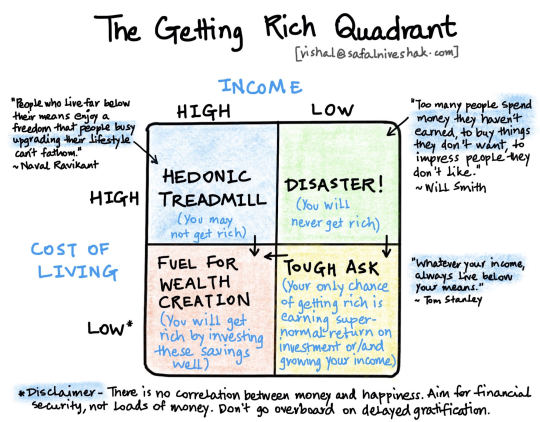
Just to explain a bit about the illustration in case you have any doubts reading it –
High income-low cost is the best combination that can take you to self-created riches, but only if you are able to invest the surplus so created sensibly, and for the long run
High income-high cost is the life a lot of people working in white-collar jobs live. We enhance our lifestyle with every increase in income, without much consideration to calling it ‘enough’ and creating greater surpluses as incomes rise. It’s like running on a hedonic treadmill (Wikipedia explains hedonic treadmill as an observed tendency of humans to quickly return to a relatively stable level of happiness despite major positive or negative events or life changes). This is a must-avoid situation when you start earning good income.
Low income-high cost is a disastrous situation if not corrected early in time. In such cases, people borrow from the future to live in the present, and the situation can get really painful and unmanageable with time. If you find yourself in such a situation, the first thing to do is to move to the low income-low cost quadrant, by spending as less money as you can. Moving straight to a high income-high cost quadrant could be difficult as incomes could be decided by various external factors. However, first moving to the low income-low cost quadrant before finally shifting to a high income-low cost quadrant is relatively easier.
If you are in a low income-low cost situation, congratulations! Now you just need to find ways to move to a high income situation. This is easier said than done but you may search for ideas around you to grow your income. Maybe, start a side business, work on additional jobs, or ask your boss for a raise. However, if you are stuck in this situation for long, and only have a tiny surplus available, the only way to get rich is to invest so well that you can compound even this small sum greatly. This, in most cases, is hope against hope and impossible unless the investment Gods have destined for you multi-baggers after multi-baggers.
Someone wise said –
Save part of your income and begin now, for the man with a surplus controls circumstances and the man without a surplus is controlled by circumstances.
I hope you are already doing this in your pursuit of financial freedom.
If not, I hope the above quadrant guides you, even if in a little way.
7. Financial Freedom
At the start of 2020, I spoke at the Value Investing Summit in Kuala Lumpur, on the subject of ‘financial freedom.’
Click here to watch the video of my talk, or watch below.
There are intermittent audio issues due to a problem with the microphone. But I know you are wise enough to not complain about the same and instead able to connect those dots looking at my slides and your own wisdom.

youtube
8. Notes from Warren Buffett’s Latest Letter
Click here to download the notes.
9. Virus is NOT risk
Virus is NOT risk. It is an uncertainty. Learn to differentiate between the two please.
Risk is measurable, like the odds of winning on any roll of a fair dice. Uncertainty is not measurable. It is and unknown unknown.
Risk comes from not knowing what you are doing. Risk comes from looking to Mr. Market for advice instead of opportunities. Risk comes from focusing on the outcome (what will happen in the future) and not the process (what can I do now). Risk comes from acting like others are acting, and mindlessly. Risk comes from investing in fundamentally bad businesses when their stocks have fallen, especially when you start to believe their cheapness provides you value. Risk, ultimately, comes from focusing on return and not risk.
In short, YOU are the biggest risk to your investments, not COVID.
Human nature has not changed between these two times –

Image Source
…so just manage the risk called YOU…like the virus that knows how to manage itself well.
10. Becoming An Investing Buddha
When it comes to investing, making money in stocks when everyone is making money in stocks isn’t a big deal. Rather, it’s the ability to handle good and bad times with equanimity, combined with courage and decisiveness, that really matters in the long run. Of course, most of us simply aren’t wired to be equanimous at most of the times, and it’s terribly difficult to rid ourselves of the emotions of ecstasy (when things are looking up) and misery (when things are looking down). And that’s why ensuring that we avoid all of those ways that can cause us wealth destruction – trading, timing, high fee, inadequate diversification, and leverage – is paramount. Everything, including our triumphs and disasters, anyways shall pass. But the equanimity with which we allow them to pass will keep us sane always.
Anyways, considering the rough waters that we have sailed through in the markets this year, I made this illustration that contains the iron rules of becoming an investing Buddha, or the one who invests in such a manner that allows him to be at peace at all times.
As Lord Krishna taught Arjuna, as we wade through the ocean of life, it throws up all kinds of waves that are beyond our control. If we keep struggling to eliminate negative situations, we will be unable to avoid unhappiness. But if we live a life of sanity and learn to accept everything that comes our way, with equanimity and without sacrificing our best efforts, that will be true Nirvāṇa.
11. Owning Stocks is a Long-Term Project
In the long journey of the stock of a high-quality business, the daily short-term jumps – or volatility as they call it in business news – that makes people nervous are “non-events.” Annie Duke writes in her brilliant book Thinking in Bets –
In our decision-making lives, we aren’t that good at taking this kind of perspective – at accessing the past and future to get a better view of how any given moment might fit into the scope of time. It just feels how it feels in the moment and we react to it.…We make a long-term stock investment because we want it to appreciate over years or decades. Yet there we are, watching a downward tick over a few minutes, consumed by imagining the worst. What’s the volume? Is it heavier than usual? Better check the news stories. Better check the message boards to find out what rumors are circulating.
Even noted psychologist Daniel Kahneman agrees –
If owning stocks is a long-term project for you, following their changes constantly is a very, very bad idea. It’s the worst possible thing you can do, because people are so sensitive to short-term losses. If you count your money every day, you’ll be miserable.
12. Why Value Investing Works
I read a post some time back wherein Jack Schwager, the author of Market Wizards series, when answering a question on whether value investing works, turned to the wisdom of Joel Greenblatt, one of the foremost experts on the subject. Schwager quoted this from his interview with Greenblatt – “Value investing doesn’t always work. The market doesn’t always agree with you. Over time, value is roughly the way the market prices stocks, but over the short term, which sometimes can be as long as two or three years, there are periods when it doesn’t work. And that is a very good thing. The fact that the value approach doesn’t work over periods of time is precisely the reason why it continues to work over the long term.”
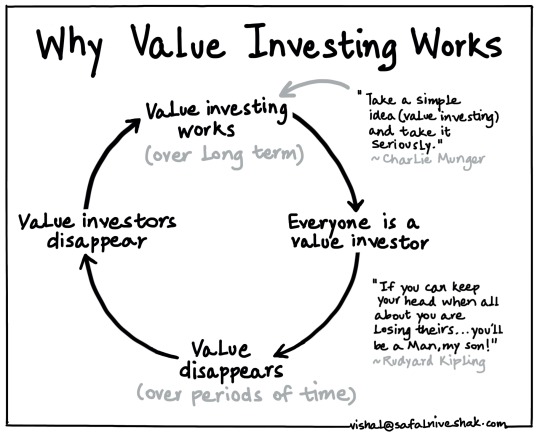
13. Oh, EBITDAC!
“Always laugh when you can. It is cheap medicine,” so said Lord Byron. Well, laughter is great. A meme circulated on Twitter some time back suggested that companies suffering from the global pandemic will trot out a new performance metric: EBITDAC, for earnings before interest, tax, depreciation, amortisation and coronavirus. It’s apparently not a joke.
Some companies are actually tweaking their figures to avoid triggering defaults on loans, like this German firm that has added back €5.4 million profits to its first quarter that it said it would have made were it not for the hit caused by lockdowns!

In simple terms, EBITDA, the elder brother of EBITDAC, is a measure of a company’s overall financial performance and is used as an alternative to simple earnings or net income. EBITDA, however, can be misleading because it strips out the cost of capital (debt) and essential investments like property, plant, and equipment (because it is prior to depreciation).
By the way, Charlie Munger has said this about EBITDA —
…every time you see the word EBITDA, you should substitute the words bullshit earnings.
Not sure what he has to say on EBITDAC!

14. How to Get Rich
Bloomberg carried this nice piece from Nir Kaissar and Barry Ritholtz, where the authors write to answer this question – How do you get rich? By earning a lot or saving a lot?
Here is Barry’s point of view on the subject of “frugality” –
I am not, nor have I ever been, a fan of “sustained and disciplined frugality.” With that said, here’s what to keep in mind:
1. Focus on the big things; the little things will take care of themselves
2. We all only have so much internal discipline, a consequence of limited mental bandwidth. Don’t fritter it away on things that don’t matter very much.
3. Spending should always be a function of what you can afford, not a slavish devotion to some puritan ideal.
4. Money can bring security, comfort and happiness, but beyond a certain point returns on having more of it diminish rapidly.
5. Experiences tend to beat material goods in terms of money well spent.
First, the big things: Your education, your career choice, your work ethic, who you marry, who you work with, your skill set, your compensation, your health, your outlook, how you think about the world and the commitment you make to yourself about continually learning and improving. Get those right, and those $5 lattes become pretty irrelevant.
Basically, the advice is this – avoid the hedonic treadmill and you will be much better off in your financial life. “Hedonic treadmill” is basically a theory positing that people repeatedly return to their baseline level of happiness, regardless of what happens to them. It is an important concept to grasp when it comes to understanding happiness, which we often lose in forever chasing rainbows.
15. The 60/40 Solution
While searching through my collection of resources on Peter Bernstein, the author of “Capital Ideas” and “Against the Gods,” I came across this brilliant article he wrote for Bloomberg many years back, titled The 60/40 Solution, wherein he talked about the lessons from history (emphasis mine) –
The constant lesson of history is the dominant role played by surprise. Just when we are most comfortable with an environment and come to believe we finally understand it, the ground shifts under our feet. Surprise is the rule, not the exception. That’s a fancy way of saying we don’t know what the future holds. Even the most serious efforts to make predictions can end up so far from the mark as to be more dangerous than useless.
All of history and all of life is stuffed full of the unexpected and the unthinkable. Survival as an investor over that famous long course depends from the very first on recognition that we do not know what is going to happen. We can speculate or calculate or estimate, but we can never be certain. Something very simple but very penetrating stems from this observation. If we never know what the future holds, we can never be right all the time. Being wrong on occasion is inescapable. As the great English economist John Maynard Keynes expressed it some 80 years ago, “A proposition is not probable because we think it so.” The most important lesson an investor can learn is to be dispassionate when confronted by unexpected and unfavorable outcomes.
16. Make-Lose Vs Lose-Make
Nassim Taleb, out of my journal, explains the concept of path dependence, which is the dependence of outcomes on the path of previous outcomes, rather than simply on current conditions –
Ironing your shirts then putting them in the washing machine produces a different outcome from washing your shirts first, then ironing them.
The reader can either trust me on this, or try the experiment with both sequences on the next Sunday afternoon. Now, assume that your capital is around one million dollars and you are involved in speculation. Apply path dependence to the reasoning.
Making a million dollars first, then losing it, is markedly different from losing a million dollars first then making it.
The first path (make-lose) leaves you intact; the second (lose) makes you bankrupt, insolvent, maimed, traumatized and more generally unable to stay in the game, thus unable to benefit from the second part of the sequence. There is no make after the lose.
Reminds me of Warren Buffett’s “Rule No. 1 – Never LOSE money.”
Consider a weak, fragile business. It is path-dependent. With stretched balance sheet, large capital requirement, and inadequate capacity to suffer, a prolonged weakness in the economy can destroy it. It is then difficult for it to rise from that ruin. When you own such a business, you have to do a lot of praying to the economics gods. Such a business starts from a “lose” and now it’s difficult, almost impossible, for it to “make” back what it lost.
On the other hand, a robust and anti-fragile business, with clean balance sheet and low capital requirement, which has built a capacity to suffer over years, is not path dependent. It can survive a weak economy. Even if the weakness persists, at worst, it may lose what it has already made, which is better than starting with losing it all.
So, check out what you already own in your portfolio. Is it in the “make, then lose” category, or “lose, then lose everything” one?
Stick with the former. Discard the latter.
17. The Dunning-Kruger Effect

18. Chance Has No Memory
In activities largely involving luck (like fair coin toss, gambling, investing), past outcomes have no effect on the current outcome. Chance occurrences do not have any relationship to things that happened before.
The probability of a child being a boy or girl is, theoretically 0.5. Since chance has no memory, that’s the same probability EVERY time. Even in a family of 10 daughters, the probability of the eleventh child being a son is, theoretically, 0.5. In a country like India, that’s an important thing to remember for parents with first 2-3 daughters but still wanting another child believing that would be a son.
Now, it may sound simple but a lot of us struggle with this idea.
People have a hard time remembering this when they invest in stocks. For example, when I see that my past 3-4 stocks have not earned me quick returns like what other stocks have earned for my friends, I am more inclined to bet on the next stock thinking, “It hasn’t happened in a while, so it’s bound to happen soon.”
It’s like Ranveer Singh singing in the movie Gully Boy, “Apna time aayega…” (my time will come).

19. Formula for Survival in Life and Investing
While reading notes from the 1989 AGM of Berkshire Hathaway, I came across this passage where Warren Buffett was asked about his approach to risk and investment decision making, and he replied –
Take the probability of loss times the amount of possible loss from the probability of gain times the amount of possible gain. That is what we’re trying to do. It’s imperfect, but that’s what it’s all about.
As an equation, it reads thus –
Success in investing = (Probability of gain X Amount of possible gain) – (Probability of loss X Amount of possible loss) = A positive number
Michael Mauboussin describes this concept as expected value. It’s actually a very simple concept.
In essence, you don’t have to be right a lot, you just have to be right about your big bets at the right time. Here, while the probabilities matter a lot, so do the consequences i.e., amount of possible gain/loss.
It’s important to get that equation right.
If you are willing to buy a stock, say, priced at 60-70x P/E or more, thinking the probability of it going higher is good, also remember the consequence of a period of weakness/slowdown in business. Such expensively priced stocks ride on high expectations, and the consequences of a small slip could be really bad.
Given that we often tell ourselves false stories to avoid the truth, with our minds clouded by denial, optimism and negative decision-making tendencies, the expected value idea can help us avoid the landmine of expensive, hot and bad stocks that cover a large ground in stock investing.
Buffett says, “In order to succeed you must first survive.”
So here’s the mantra.
In life, to live, simply avoid dying (till you can).
In investing, to succeed, simply avoid ruin (till you can).
20. Why We Make Bad Decisions
Short answer – We have design flaws. We are fairly sure we are way above average, and we are also sure we see everything perfectly.
Long answer – Ray Dalio wrote in his book Principles –
The two biggest barriers to good decision making are your ego and your blind spots. Together, they make it difficult for you to objectively see what is true about you and your circumstances and to make the best possible decisions by getting the most out of others. If you can understand how the machine that is the human brain works, you can understand why these barriers exist and how to adjust your behavior to make yourself happier, more effective, and better at interacting with others.

21. Not Everyone Should Pick Stocks
Despite the growing popularity of investing, not everyone is suited to manage his or her own stock market investments, it is not a matter of pride if you are able to do it or a matter of shame if you are not able to do it well.
The idea is to just let your savings compound at rates that help you maintain your purchasing power over years. Whether you do it through your own stock picking skills, or hire a fund manager, does not make a difference. The only condition is that your money must be handled well.
Seeking help is always a good idea. And accepting that you may not be capable enough to manage things on your own is even better.
Your stocks don’t know you own them. And, whatever those people who entice you to get rich through investing may promise you, please don’t see investing in stocks as a way to get rich. Such ideas are often masked by survivorship bias, which is a logical error of concentrating only on people or things that “survived” some process and inadvertently overlooking those that did not. So, taking inspiration from other investors who have made good money from “100-to-1 stocks” and ignoring others who followed similar processes but ended up with disasters can lead you to false conclusions about your own potential as an investor and stock picker.
Look at investing as a way to keep you rich i.e., help you grow your purchasing power. Look at your work – job / profession / business – to make you rich and thus focus more energy and focus there than on the stock market.
22. Stock Prices: Information or Influence?
In one of his papers on qualities of great investors, Michael Mauboussin writes that investing is an inherently social exercise. Stock prices often go from being a source of information to a source of influence.
Consider the history of stock market bubbles. As stocks surge, people who own them get rich on paper. This causes envy among people who do not own the surging shares. Their mind shuts down and they end up buying stocks at extremely high prices (even Newton did that!). This feeds the process. Everyone wants to get on board the stock’s gravy train because everyone else is.
Wise investors do not get drawn into such whirlpool of influence. They ignore the views of others and use their own minds. This is difficult, though, as it requires the trait of not caring what others think of you, which does not come naturally to humans.
Mauboussin writes that the crowd is often right, but when it is wrong you need the psychological courage to go against the grain.
23. Beware the Excel Spreadsheet
Here is how we twist spreadsheets to fit our versions of reality when it comes to investing in stocks –
youtube
24. The Only Way to Win in Investing
Here is a story I read recently –
A giant ship engine failed. The ship’s owners tried one expert after another, but none of them could figure but how to fix the engine.
Then they brought in an old man who had been fixing ships since he was a young boy. He carried a large bag of tools with him, and when he arrived, he immediately went to work. He inspected the engine very carefully, top to bottom.
Two of the ship’s owners were there, watching this man, hoping he would know what to do. After looking things over, the old man reached into his bag and pulled out a small hammer. He gently tapped something. Instantly, the engine lurched into life. He carefully put his hammer away. The engine was fixed!
A week later, the owners received a bill from the old man for ten thousand dollars.
“What?!” the owners exclaimed. “He hardly did anything!” So they wrote the old man a note saying, “Please send us an itemized bill.”
The man sent a bill that read:
Tapping with a hammer………………….. $ 2.00
Knowing where to tap…………………….. $ 9,998.00
Knowing where to tap – the process – makes all the difference, whether you are working with a hammer or with your money.
25. When Long-Term Investing is a Bad Idea
Long term investing is a good idea. Forced long term investing is not. When your premise does not work out, or you no longer believe in a stock, you must sell, even if it means a loss. A lot of investors hold on to bad stocks just to get their “money back.” This, I believe, is one of the biggest reasons to lose money in stocks. Remember that the deeper you fall with bad stocks, the more you must gain back to get your money back. And it is often a bad idea to try to get your money back the exact way you lost it.

When it comes to losing stocks in your portfolio, always remember the first law of holes – If you find yourself in a hole, stop digging.
26. A Pocket Guide for Wealthier Life
I recently made a pocket-zine for my kids that contained some lessons on living a good life.
They loved holding and reading it as much as I loved creating it.
Well, call it a positive feedback loop, that zine has led me to create one more. This time on the most important things in personal finance.
I call it – Personal Finance for Smart People: A Pocket Guide for Wealthier Life.

Click here to download the PDF version.
Please note that personal finance is, well, personal. So, it is OK if you reject all the ideas in this zine. See these ideas in context of your own financial goals and circumstances.
27. Investing’s Five Most Irrelevant Facts
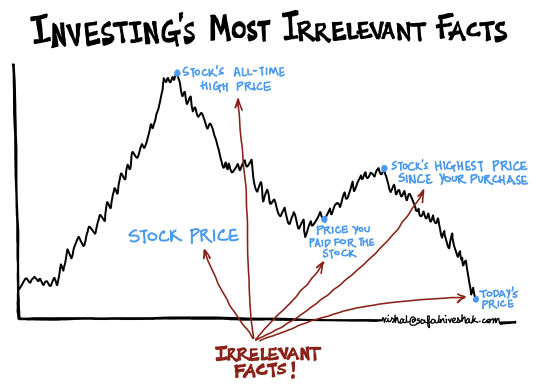
* * *
Life
28. Imagine!
Here’s a note from Ashlee Vance’s biography of Elon Musk –

Visual thinking is a great way to understand complex or potentially confusing information, and also a way to organize your thoughts and improve your ability to think and communicate.
Imagine someone talking to you, and starting with the word – “Imagine…”
You are completely hooked, isn’t it?
Consider this excerpt from Richard Feynman’s The Pleasure of Finding Things Out, where his father helps him visualize about dinosaurs –
We had the Encyclopedia Britannica at home and even when I was a small boy my father used to sit me on his lap and read to me from the Encyclopedia Britannica, and we would read, say, about dinosaurs and maybe it would be talking about the brontosaurus or something, or tyrannosaurus rex, and it would say something like, ‘This thing is twenty-five feet high and the head is six feet across,’ you see, and so he’d stop and say, ‘let’s see what that means. That would mean that if he stood in our front yard he would be high enough to put his head through the window but not quite because the head is a little bit too wide and it would break the window as it came by.’ Everything we’d read would be translated as best as we could into some reality and so I learned to do that – everything that I read I try to figure out what it really means, what it’s really saying by translating.
Then consider how Warren Buffett visually convinced me why gold was a bad investment…
I will say this about gold. If you took all the gold in the world, it would roughly make a cube 67 feet on a side… Now for that same cube of gold, it would be worth at today’s market prices about $7 trillion dollars – that’s probably about a third of the value of all the stocks in the United States… For $7 trillion dollars… you could have all the farmland in the United States, you could have about seven Exxon Mobils, and you could have a trillion dollars of walking-around money… And if you offered me the choice of looking at some 67-foot cube of gold and looking at it all day, and you know me touching it and fondling it occasionally…Call me crazy, but I’ll take the farmland and the Exxon Mobils.
I’ve tried my hands at visual thinking this way –
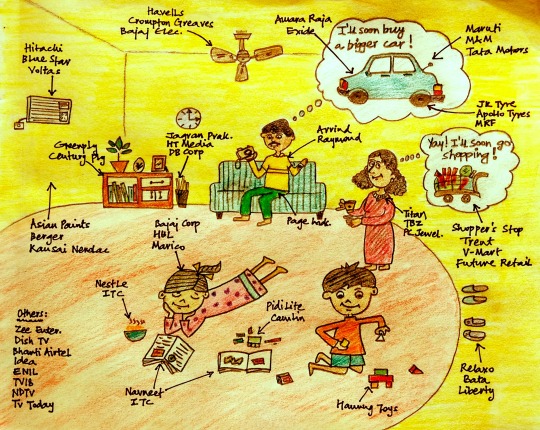
You may want to check out my Wall of Ideas for more such examples of visual thinking.
Now, visual thinking is not a new lesson that I would attribute to Elon Musk. But imagine the kind of businesses he is building, to save the world, which he had originally visualized when he was under ten years of age.
When it comes to investing, you can avoid yourself a lot of pain by just visualizing your life after you’ve lost a lot of money trading and speculating in the stock market. If the visuals unnerve you, don’t do anything that would get you into such a situation. That’s also the concept of inversion.
I personally used visual thinking when I was deciding about quitting my job to start Safal Niveshak to help small investors become better at their investment decision making. Of course, when I had started planning my future after a job, the first visual was that of – not being successful in my future work, getting over my savings, and having to return to a job.
But another visual I saw was of helping people, enjoying the freedom of doing things my way, and spending a lot of time with my family. And I thank my stars that this was more powerful than the visual of losing everything.
29. Chop Wood, Carry Water
Many of us get caught up in the end results of what we’re working toward or the way things will be when we finally achieve something.
I lived the same way till a few years back.
I thought that once I achieved some future state – promotion, financial independence, enlightenment, the top of the mountain, etc. – I will finally be content. I lived in the future or the past … in my head.
But the truth is that none of these destinations brought me any lasting contentment. Further, getting to where I wanted to go or being “successful” never meant that the work that led me there went away. Instead, I realized that contentment can only be found in every ‘now,’ in being fully present with ordinary daily activities – with chopping wood and carrying water.
It’s only when I was able to find fulfillment in life’s ordinary activities – like eating, walking, writing, cleaning the floor, or washing dishes – I could finally be at peace. It was just me, and my doing. And I realized, this is all that mattered. In this, there was everything.
You see, once you finally achieve “enlightenment,” you must still chop wood and carry water. You must still do your work, do it well, and when you find success, do it again.
Tom Barrett explained on his blog Interlude Retreat –
We travel to the ocean or to mountains, rivers and canyons, in part to escape the mundane world of work, but also to experience the awe that arises more spontaneously in nature’s magnificence. We give ourselves an incredible gift when we can experience some of the same awe in the mundane world of our daily lives. The weed that grows in the crack of a sidewalk is a phenomenon as miraculous as the redwood tree that towers into the sky. The raindrops that streak the window are no less an occasion for awe than the spray that dampens our face at the waterfall. The fingers that tap a keyboard are as worthy of praise as the feet of a ballet dancer.
When we open awareness to the tasks in our lives they become lighter. When we are able to be in the moment, we no longer feel compelled to watch the clock. Whatever your work might be, bring all of yourself to it. When you are fully present, you may find that your labor is no longer a burden.
Wood is chopped. Water is carried. Life happens.
30. Have courage
Life is not always easy. But you get through it with courage. There will be times in your life where you’d rather hide or run or bury your head in the sand than face whatever challenge is in your way. In those times, I want you to remember to be brave and show courage. Also, do not be afraid to take risks. You can accomplish great things by taking the right kind of risks. Do not also be afraid to make mistakes, but make sure you learn from them. There are, after all, no mistakes…only lessons. Most importantly, when you fail, get back up, dust yourself off, and try again.
31. Be kind, always
Put kindness first. Kindness is when you empathise with others in their troubles, when you treat others the way they want to be treated, when you think and act selflessly without expecting anything in return, when you appreciate others for their work, when you forgive others for their mistakes, and when you carefully listen to someone sharing their problems. “Everyone you meet is fighting a battle, everyone’s lonesome,” said Marion Parker. Given this, learn to deal kindly and compassionately with others. That is your only hope to happily live yourself and leave this world a better place than you found it.
32. Seize each day
Steve Jobs, as he shared in his commencement speech at Stanford University in 2005, read a quote early in his life that went something like: ‘If you live each day as if it was your last, someday you’ll most certainly be right.’ This is what Jobs told the students – “It made an impression on me, and since then, for the past thirty-three years, I have looked in the mirror every morning and asked myself: ‘If today were the last day of my life, would I want to do what I am about to do today?’ And whenever the answer has been ‘No’ for too many days in a row, I know I need to change something.” Keep this perspective that you don’t live forever and should focus on doing what really matters, today. This moment, this day, is all you have. Seize it.
33. Embrace your imperfections
As we wade through life’s muddled waters, especially as young adults, we tend deep down to be hopeful that we will eventually manage to settle down well and find perfection in a number of areas. We dream of one day securing healthy relationships, deeply fulfilling work, happy family life, and the respect of others. But life, as it is, has a habit of springing surprises, and rushing us in its overwhelming tide. It sometimes deals us a range of blows, leaving our dreams shattered. And like a favorite cup or plate, we sometimes crack. We may even break.
Obviously, you must not throw yourself away when this happens. Instead, you can relish the blemishes and learn to turn these scars into art – like ‘kintsugi,’ an ancient Japanese practice that beautifies broken pottery. In Zen aesthetics, the broken pieces of a ceramic pot should be carefully picked up, reassembled, and then glued together with lacquer inflected with gold powder. The Japanese believe the golden cracks make the pieces even more valuable. It embraces the breakage as part of the object’s history, instead of something unacceptable to be hidden or thrown away.
It is beautiful to think of kintsugi as a metaphor for your life, to see the broken, difficult, or painful parts of you as radiating light, gold, and beauty. It teaches that your broken places make you stronger and better than ever before. The times when you get hurt and broken, you can feel totally rotten. But there can also be a strange beauty in the way you process the cracks in your life and the lessons you take from them afterward. You can decide to cover up, or you can decide to walk out into the world as yourself, with your cracks shining gold.
34. Find your true desire, then live it
In a thought-provoking lecture many years ago, British philosopher and writer Alan Watts told the audience this –
Students…come to me and say, ‘We’re getting out of college and we have the faintest idea of what we want to do.’ I always ask the question, what would you like to do if money were no object? How would you really enjoy spending your life? …Students say, we’d like to be painters, we’d like to be poets, we’d like to be writers, but as everybody knows, you can’t earn any money that way. Let’s go through with it, what do you want to do? When we finally got down to something which the individual says he really wants to do, I will say to him: you do that and forget the money. Because if you say that getting the money is the most important thing you will spend your life completely wasting your time. You’ll be doing things you don’t like doing in order to go on living that is to go on doing things you don’t like doing, which is stupid. Better to have a short life full of what you like doing, than a long life, spent in a miserable way. After all if you really like what you’re doing, it doesn’t matter what it is, you can eventually become a master of it. The only way to become a master of something is to be really with it. And then you’ll be able to get a good fee for whatever it is…Therefore, it’s so important to consider this question: What do I desire?
What you desire is the reason for which you get up in the morning. Go, search for it. And till you find it, keep looking and do not settle.
35. Live like a verb, not a noun
I recently came across this thought-provoking paragraph from the English actor, comedian, and writer Stephen Fry, while browsing a notebook I had scribbled thoughts in some years ago – “Oscar Wilde said that if you know what you want to be, then you inevitably become it. That is your punishment. But if you never know, then you can be anything. There is a truth to that. We are not nouns, we are verbs. I am not a thing — an actor, a writer — I am a person who does things — I write, I act — and I never know what I am going to do next. I think you can be imprisoned if you think of yourself as a noun.”
Learn to give yourself permission to ‘do’ what brings you the greatest joy – except, say, getting involved in drugs etc. That’s the way you will find satisfaction in life. What will lead you to a fulfilling life isn’t the nouns you may use for yourself – dancer, writer, investor, teacher – but the verbs you will be – the growing, learning, and pursuing that will happen in the process.
36. Forgive over and over and over
You are going to have your heartbroken. Whether it’s a fall out with a friend you thought you were close with, or that career that you wish you got. It’s life, it’s going to happen. Take it for the lesson it was and move on. And never hold on to grudges against others and yourself. When we harbor unforgiveness and blame others for all our misery, it slowly eats us away, breeding hatred, and destroying our relationship with that other person, and also with our inner self. But when you decide to forgive, it is like an instant miraculous healing process. It is the key to moving on.
When people do not act as you would wish them to, exercise the muscles of your good nature by shrugging your shoulders and saying to yourself “Oh well.” Then let the incident go. Also, try to be as kind to yourself as possible, by forgiving yourself for mistakes made. The Greek philosopher Epictetus advised, “Do not measure yourself against others or even against your ideal self. Human betterment is a gradual, two-steps-forward, one-step-back effort. When you learn to forgive, others and yourself, and let go, you will be surprised to discover the lightness and freedom that unfold thereafter from within you. Forgiveness won’t necessarily erase all your pain. But it does mean that the hurt is no longer center stage.
37. Do not take life so seriously
Our DNA is 96% chimpanzee, so what’s the point of taking life any seriously than a chimp does? Laugh at yourself when you make mistakes. Do not worry about things you cannot control.
You get around 80-90 trips around the sun. Embrace them and enjoy your ride to the fullest. 99% of what you will think as problems won’t even be real problems anyway, just situations your mind would make into some big and unnecessary drama. So, remember to relax. Do not live in your head so much.
38. Value People
In his book, The Education of a Value Investor, Guy Spier writes about a story of one Ian Jacobs, a Columbia Business School graduate who successfully applied for a job with Warren Buffett. Along with his cover letter, Jacobs enclosed a cheque to compensate Buffett for his time in evaluating this job application. Jacobs’s cheque showed how much he respected the value of Buffett’s time. Guy writes –
The key, in my experience, is to value people as an end in themselves, not as a means to our own ends. Mohnish (Pabrai) often quotes a beautiful line from the Bible, “I am but dust and ashes.”
Thanks in large part to Mohnish and Warren, I began to realize that I ought to focus more on what others need from me instead of constantly trying to get them to fulfill my own needs. This might sound obvious, but it’s been a huge psychological shift for me, and it’s really changed the way that I live my life.
This is so unlike what happens in the financial services industry where people selfishly work for their own incentives, others be damned! And this is one of the key reasons for my disgust with this industry.
It is important to see and treat people not as ladders on which one must climb to achieve one’s personal success, but as part of a wonderful ecosystem where one can survive and prosper only when others survive and prosper.
Like here is what Buffett has a key part of his Owner’s Manual –
We will be candid in our reporting to you, emphasizing the pluses and minuses important in appraising business value. Our guideline is to tell you the business facts that we would want to know if our positions were reversed. We owe you no less.
In other words, Buffett treats shareholders and managers in his acquired businesses as he would wish to be treated if the positions were reversed.
This is in fact the Golden Rule or ethic of reciprocity – One should treat others as one would like others to treat oneself.
39. Don’t worry too much about making money
It won’t change the way you live. Time spent earning enough money is time reasonably well spent. Time earning an excess of money far beyond that required to meet one’s needs, however, is time wasted. So, know how much is enough.
As far as saving money is concerned, take it seriously but not too much that you compromise your and your family’s present. Especially when you are making a reasonable income and are already saving enough, remember what Warren Buffett says –
…who is to say whether it is better to defer a dollar of expenditure on your family – on a trip to Disneyland or something that they’ll get enormous enjoyment out of – so that when you are 75, you can have a 30-feet boat instead of a 20-feet boat. There are advantages to spending money on your family when it is young – giving them various forms of enjoyment, education, or whatever it may be. But it’s crazy to be spending 105% of your income.
40. Don’t put off “living happily ever after” for another year.
Don’t assume you’ll have another year. You won’t get this life again. No one will bring back the years; no one will restore you to yourself. Life will follow the path it began to take, and will neither reverse nor check its course. Life will not lengthen at your command. As it started out on its first day, so it will run on, nowhere pausing or turning aside. Stop being busy. Tell the ones you love how much you love them often enough. You could be very happy with almost nothing if you had a loving family, and you weren’t competing with a lot of other people who had more than you did.
41. How to Get Rich Quick
Get rich quick by doing these five simple things –
Create value for others;
Contribute to someone, without keeping score;
Say what needs to be said;
Learn something new, something scary; and
Reject false shortcuts.
42. Deal well with your fears.
We’re all fearful…of some things…and many things. I’ve never seen any person who has no fear. However, in dealing with fear several times over the past few years, I have realized one very important thing.
It is that, in our life, the issue is not really ‘fear’ but rather, what we do despite it. We can either get managed by fear, or manage it. We can either acknowledge fear or fall into an emotional whirlpool. We can either accept fear or pretend that it doesn’t exist at all. We can either give up or get up in the face of fear.
In fact, fear is what keeps us safe at most times in our lives. Fear keeps us out of harm’s way. All we need to have is the courage to manage it. Now, nobody can give us the courage. Even if Buddha were sitting right here next to you, he couldn’t give it to you. You have to practice it and realize it yourself. You have to make a habit of mindfulness practice to get over your fears. Then, when fear strikes you, you will already know what to do.
43. Life is Short

Most of what happens to us in life is anyways beyond our control, and we must learn to let it go.
But I firmly believe in what Mark Twain said –
Twenty years from now you will be more disappointed by the things that you didn’t do than by the ones you did do. So throw off the bowlines. Sail away from the safe harbor. Catch the trade winds in your sails. Explore. Dream. Discover.
Now is the time, my dear friend, to explore, dream, discover. Because life, as we may live it, is really short.
44. You Are A Black Swan
Black swan is a Latin expression, which was commonly used as a metaphor to describe something impossible or something non-existent. It came from the old-world belief that all swans are white since no one had seen a black swan before. Every time someone spotted a white swan, it was confirmation of their belief i.e., “all swans are white.” But this long held notion was invalidated the day first black swan was spotted.
A black swan event has following three attributes, writes Taleb in his book –
First, it is an outlier, as it lies outside the realm of regular expectations, because nothing in the past can convincingly point to its possibility. Second, it carries an extreme impact (unlike the bird). Third, in spite of its outlier status, human nature makes us concoct explanations for its occurrence after the fact, making it explainable and predictable.
Apart from the central theme of black swan, Taleb’s book is choc-full of mind stretching ideas. I’ll leave you with the very last passage from The Black Swan which I found remarkably comforting. Taleb writes –
I am sometimes taken aback by how people can have a miserable day or get angry because they feel cheated by a bad meal, cold coffee, a social rebuff or a rude reception…We are quick to forget that just being alive is an extraordinary piece of good luck, a remote event, a chance occurrence of monstrous proportions.
Imagine a speck of dust next to a planet a billion times the size of the earth. The speck of dust represents the odds in favour of your being born; the huge planet would be the odds against it. So stop sweating the small stuff. Don’t be like the ingrate who got a castle as a present and worried about the mildew in the bathroom. Stop looking the gift horse in the mouth – remember that you are a Black Swan.
45. Enjoy the Journey
Zen and the Art of Motorcycle Maintenance (ZAMM) is the autobiography of American writer and philosopher Robert Pirsig, wherein he chronicles his motorcycle journey across the country with his son. It is however much more than just an adventure tale. Through his journey, Pirsig explains his philosophy on life, creating a manifesto through motorcycle maintenance.
There are many lessons to be learned from this book, but a handful of persist throughout the story that can help reshape your perspective. Like, here is what Pirsig writes on how we lose so much time on unnecessary affairs that we move swiftly past what is really important –
We’re in such a hurry most of the time we never get much chance to talk. The result is a kind of endless day-to-day shallowness, a monotony that leaves a person wondering years later where all the time went and sorry that it’s all gone.
Then, here is Pirsig’s idea of how to fix the world –
The place to improve the world is first in one’s own heart and head and hands, and then work outward from there. Other people can talk about how to expand the destiny of mankind. I just want to talk about how to fix a motorcycle.
One of the most beautiful lessons I take from the books is the idea of enjoying the journey instead of just waiting for the destination. As Pirsig writes –
Mountains should be climbed with as little effort as possible and without desire. The reality of your own nature should determine the speed. If you become restless, speed up. If you become winded, slow down. You climb the mountain in an equilibrium between restlessness and exhaustion. Then, when you are no longer thinking ahead, each footstep isn’t just a means to an an end but a unique event in itself. This leaf has jagged edges. This rock looks loose. From this place the snow is less visible, even though closer. These are things you should notice anyway. To live only for some future goal is shallow. It’s the sides of the mountain that sustain life, not the top. Here’s where things grow.
46. What We Leave Behind
I read a beautiful, new post from Prof. Scott Galloway titled What We Leave Behind, wherein he writes how the fastest path to a better life is regularly assessing what we leave behind, and that money or wealth are not as important parts of the equation of what we leave behind as we usually think about. Spending time with our children is.
Prof. Galloway writes –
Money is a vehicle for the transfer of time and work from one entity to another. So, if we spend less money on one thing, we can invest more time on another. Could we invest less in stuff, less in commuting, and more in relationships? I’ve been howling in the money storm for so long. Believing my worth to others was a function of the stuff I had, or didn’t have.
We proffer admiration, affection, and a sense of awe on people who aggregate wealth. But that affection is often misplaced, as wealth can lead to greed and lack of empathy. This is an opportunity to spend less on stuff, spend less time commuting, and reallocate that capital and time to our partners and children.
On my podcast, the Prof G Show, I interviewed philosopher and neuroscientist Sam Harris. I asked him for one piece of advice on how to be a better man. He offered that rather than trying to parent, cajole, discipline, or guide your children, your real purpose is just…to love them. My nine-year-old has been having a hard time with corona. I’m spending less time correcting, explaining, arguing, and more just loving…sitting in his room when he’s doing homework, engaging in conversation, and watching The Simpsons together. We’re on season 5, there’s 31.
And…we’ll get there.
This is such a refreshing thought. It reminds us to examine our lives way more often and with deeper reflection. We are building a legacy every day, whether or not we are intentional about it. As we move forward through these challenging times, let’s keep our hearts and minds fastened on that we will leave behind.
47. Meditation
Meditation has been a great tool to help me learn to be mindful, which is to be present and aware, moment by moment, regardless of circumstances. And when it comes to investing, I find mindfulness to be one of our best defenses against behavioural biases. Why?
You see, the stock market is by definition, anxiety-inducing. Ben Graham called stock price fluctuations represented by Mr. Market as manic depressive. Look at people trading inside dealing rooms. Or just look at the talking heads on business television and you will know what I’m talking about. Amidst this chaos, a state of mindfulness can help you put your mind in a healthier, more balanced and unemotional state.
You won’t be worried about short term fluctuations in stock prices.
You won’t act in haste or on impulse.
You won’t be distracted by regrets of your past performance or worries about your future returns.
You would keep yourself immune to the news and noise all around.
You would try to do your best work in the present, with utmost focus and discipline.
These are all necessary attributes you need to achieve success as an investor. As Charlie Munger says –
A lot of people with high IQs are terrible investors because they’ve got terrible temperaments. And that is why we say that having a certain kind of temperament is more important than brains. You need to keep raw irrational emotion under control. You need patience and discipline and an ability to take losses and adversity without going crazy. You need an ability to not be driven crazy by extreme success.
This is all what meditation and mindfulness can teach you, and much more. Try it to see for yourself.

48. A Father’s Lessons for a Good Life
I made a pocket-zine for my kids that contained some lessons on living a good life. They loved the idea and the lessons. I loved their smiles.

Click here to download the PDF version.
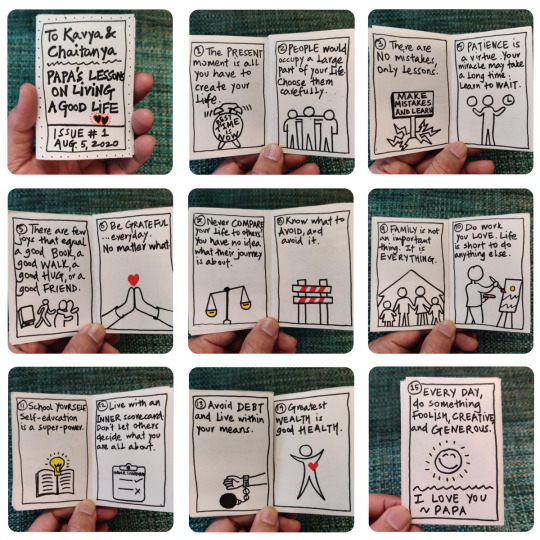
49. Weathering Life’s Storms
In ancient Greece and Rome, many prominent thinkers subscribed to a philosophy called Stoicism. As part of this philosophy, they practiced a thought exercise called premeditatio malorum, which means premeditation of evils.
It simply means taking a moment to think through everything that could go wrong with a particular plan. It means visualizing a bad future.
The idea behind premeditatio malorum is that by contemplating calamity, we rob future hardships of their bite and appreciate what we have now. In other words, anticipating adversity is likely to diminish its power on us when it actually strikes.
Now, meditating on the worst that may happen to us seems like a negative way to live life. On the contrary, this exercise is calming, because it leads us to prepare ourselves mentally and otherwise to deal with an uncertain future. Also, if we take time to think through the bad things that may fall upon us, what Charlie Munger calls the places where we may die, we may find ways to not go there in the first place.
Imagine getting hit by the corona virus, or losing your job, or the stock market tanking and your investments getting wiped out. Then, while letting the future be because you anyways don’t control it, try doing things that may keep you at safe distance from these possibilities as much as possible.
In particular, while practicing premeditatio malorum, the Stoics frequently reminded themselves that both they and their loved ones were mortal, and bound to die one day, and that life was inevitably transient. This is one of the best ways we can indulge in this thought practice, by meditating on mortality.
As the Stoic philosopher Seneca advised –
Let us prepare our minds as if we’d come to the very end of life. Let us postpone nothing. Let us balance life’s books each day … The one who puts the finishing touches on their life each day is never short of time.
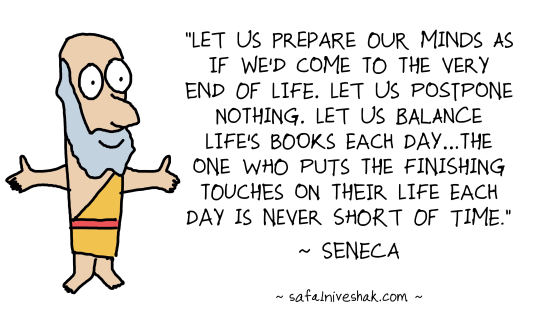
50. Start Preparing for Tomorrow
We often blame our past and worry about our future.
The fact is that – and you also know this – life is in living NOW. It’s all about the…
Things we learn now;
Choices we make now;
Habits we form now;
Actions we take now; and
Enlightenment we receive now
Regretting about the past – “If only I could’ve started investing earlier!” or “If only I had not made that investing mistake!” – is like wasting time and energy on the impossible. And worrying about the future – the Tomorrow – is like having no belief in your capabilities.
If you can live in the present, connect with it, accept it, and experience the joy of flying in the NOW, you would surely head towards a brighter Tomorrow.
In fact, the best possible way to prepare for Tomorrow is to concentrate with all your intelligence, all your enthusiasm, on doing today’s work superbly today.
When I was ten years old, my grandfather would draw me a house with windows and doors. He would tell me how many brick lengths the bottom and sides needed, and how many brick lengths each window and door would take.
Then he asked me how many bricks it would take to build the whole house. If I had trouble answering, he wouldn’t get upset.
He would simply say: “This is how you build a house. One brick at a time.”
Well, this is also how you prepare for Tomorrow.
By seeing it now, and then, as Charlie Munger would have loved to see you do, working backward to achieve it.
As Stephen Covey writes as his second habit of highly effective people – Begin with the end in mind.
Well, that’s where you should also begin – End…Tomorrow. Then work backward.
51. Fear
Here is a beautiful poem from Khalil Gibran, the Lebanese poet well known for his book, The Prophet, that strikes a chord deep within.
FEAR (Khalil Gibran)
It is said that before entering the sea
a river trembles with fear.
She looks back at the path she has traveled,
from the peaks of the mountains,
the long winding road crossing forests and villages.
And in front of her,
she sees an ocean so vast,
that to enter
there seems nothing more than to disappear forever.
But there is no other way.
The river can not go back.
Nobody can go back.
To go back is impossible in existence.
The river needs to take the risk
of entering the ocean
because only then will fear disappear,
because that’s where the river will know
it’s not about disappearing into the ocean,
but of becoming the ocean.
* * *
Benjamin Franklin said, “Be at war with your vices, at peace with your neighbors, and let every new year find you a better man.
I’m so grateful to have you share this journey with me in 2020, and I look forward to continuing our connection in 2021, whatever it may bring.
Stay happy and healthy.
Happy 2021.
With respect,
Vishal
The post 51 Ideas from 2020 appeared first on Safal Niveshak.
51 Ideas from 2020 published first on https://mbploans.tumblr.com/
0 notes
Text

I posted 47 times in 2021
43 posts created (91%)
4 posts reblogged (9%)
For every post I created, I reblogged 0.1 posts.
I added 155 tags in 2021
#literature - 32 posts
#books - 22 posts
#hyeji reads 📚 - 18 posts
#russian literature - 16 posts
#classical literature - 14 posts
#books & libraries - 12 posts
#japanese literature - 12 posts
#fyodor dostoevsky - 11 posts
#book blog - 10 posts
#books and literature - 8 posts
Longest Tag: 46 characters
#ligeia was a dark academia icon prove me wrong
My Top Posts in 2021
#5
This Week’s Book is...

The collected works of Fyodor Dostoevsky!
If you know, I have a soft spot for Russian authors (and Japanese authors). I went to a couple of bookstores with my friend on Saturday and we had so much fun buying books! I ended up buying this, the Resurrection (again), and the Scarlet Letter (for collection purposes). I love this funky Russian man so much (is it okay to call a literary giant “funky”?), I’ve been collecting his works nowadays. This anthology contains The Double, Poor Folk, Notes from the Underground, “White Nights”, “Another Man’s Wife” , and an excerpt from the iconic Crime and Punishment. And I bought it for 6,750 won (abt 5.71 usd)!
The weather is getting colder in South Korea now and here I am, accidentally ordering iced coffee while wearing five layers of clothing and a scarf. Stay safe and don’t catch colds everyone <3
18 notes • Posted 2021-10-17 05:22:41 GMT
#4
Fyodor Dostoevsky b-day post!
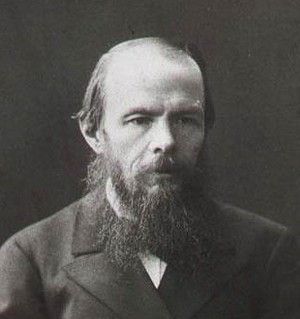
Born on Nov. 11th, 1821, the popular Russian novelist, essayist, short story writer, and journalist Fyodor Mikhailovich Dostoevsky (also spelt Dostoyevsky) was born! His works cover the human psyche in the lower class of 19th century Russia, but don't hesitate to touch upon themes of philosophy and religion. There are so many things about this man that we could cover and so many places to start from; it's almost overwhelming.
Dostoevsky is one of Russia's most famous and widely-read authors, with many of his works translated into over 170 languages and many movies use his books as a basis. His influence didn't only live in Russia; many other philsophers, authors, and famed mathematician Albert Einstein had given their thanks to the novelist. Friedrich Nietzsche had said that Dostoevksy was "the only psychologist ... from whom I had something to learn; he ranks among the most beautiful strokes of fortune in my life."
As a psychologist and philsopher, Dostoevsky incorporates such ideas (i.e. suicide, morality, human manipulation, dreams and their interpretation, etc) into his works and expresses them with great prose and use of polyphony. Traces of Gothic fiction and Romanticism are evident, but not as strong as the realism and existentialism in his stories.
To say that he was a religious man was both an understatement and overstatement (well, it's just a statement then). His family was of the Russian Orthodox faith and Dostoevsky was well accquainted with the Gospel from a young age. Even during his time in military school, he would read from a book of devotions where Christianity was free from dogma and that love was applied to social situations which shines light on the themes of remdemption and forgiveness shown in his books ( and which possibly lead him to an interest in Christian socialism-). During his time in the penal colony, he heavily focused on Christ and the New Testament, writing that he would die with Christ rather than be with the truth outside of Christ. Despite being a pious man, he rarely went to church, had a gambling addiction (but that led to his literary career taking flight), and hated priests; but would talk about Jesus as if he were the best thing since sliced bread (pretty sure that sliced bread wasn't a thing in Russia at the time but ykik).
There's something so compelling about his works. Maybe it's the characters or the bleak atmosphere that most Russian classics have, but we can agree that his mind is an absolute treasure trove. Whenever I read his books, I often find myself wishing to dig around this man's mind. I want to know where all of this truly started. Yesterday, my friend was so excited to tell me that he had bought a collection of Dostoevsky's works in honor of his 200th birthday and that the price was also affordable considering the quality. I was over the moon to hear that because one, I like his writing, and two, I'm glad that my friend took my recommendation.
I have mixed opinions on him. As a person, he was an unfaithful husband and gambler, but as an author, I praise and look up to him. As I have been compared to him on countless occasions , I can't seem to wrap my head around his greatness and how that ties into my own work.
Anyways, happy birthday to this absolute fucking icon of the Golden Age of Russian Literature, it's an honor to be alive in this day and age to enjoy his writing and celebrate his 200th birthday!
Recommended works:
Crime and Punishment
The Brothers Karamazov
The Double
NOTES FROM UNDERGROUND
DEMONS
The Idiot
The Adolescent
Feel free to add your own recs!
19 notes • Posted 2021-11-10 23:47:52 GMT
#3
Agatha Christie bday post!

Happy birthday to the queen of mystery fiction! Born on Sept. 15, 1890, Dame Agatha Mary Clarissa Christie (DBE, also can be Lady Mallowan) is known for her mystery works circulating around the iconic detective Hercule Poirot; as well as the world's longest running play, The Mousetrap. She also served in the medical field in both World Wars and used that knowledge (specifically on poisons) in her books. I would have sold my firstborn child to meet her in person, her style of writing and the plot of each story is so much fun to read! I remember reading Murder on the Orient Express for the first time and fell in love with her-
Over her lifetime, she wrote 66 mystery novels and 14 collections of short stories. Many of her works were adapted and referenced into pop culture, with movies of her works galore. Another thing to note is that her first novel was written because of a dare! Honestly, I could never do such a thing and that's why I hold so much respect for her.
Her disappearance in 1926 took the media by storm after her car was found parked near a quarry without any trace of Christie inside, triggering a manhunt for the author. She was found safe and sound at Swan Hydropathic Hotel in Harrogate, like she told her brother-in-law. What happened in between those ten days however, will remain a mystery that died with Agatha Christie.
Once again, happy birthday to the amazing Agatha Christie, we love you very much <3
Recommended works:
Death on the Nile
Murder on the Orient Express
And Then There Were None
The A.B.C Murders
22 notes • Posted 2021-09-15 00:56:58 GMT
#2
bsd kins
me: why am I so mentally unstable????
also me: *kins these three*


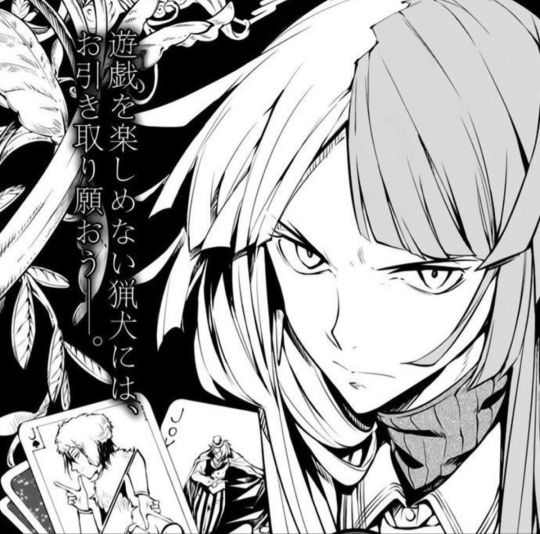
it’s not a fun little thing pls help-
22 notes • Posted 2021-09-11 12:02:25 GMT
#1
Introduction and Opinions on Dazai Osamu

(*Note that I will be using the last name/first name format.)
Tw// drug abuse and suicide
Born as Tsushima Shuji (津島修治) on June 13th, 1909, Dazai Osamu (太宰治) is considered a literary giant within Japan, with swarms of people visiting his grave every year in June and having his works referred to in pop culture. However, only a few of his works are translated and open for the foreign public to read. Many of you may be familiar with his most last work, No Longer Human (人間失格), the semi-autobiographical novel about himself through the character Oba Yozo. It's Japan's second best-selling novel, it's first being Natsume Souseki's Kokoro (こころ)
Many of Dazai's novels blend in with his personal life, his struggles with society and post-war reformation. Another example would be The Setting Sun (斜陽), a story that follows the post war lives of a family and its primary characters, Kazuko, her brother Naoji, and their elderly mother. I personally loved Naoji and his character, serving as brain food that left me even hungrier.
He was inspired by Akutagawa Ryuunosuke, the father of Japanese short story, who also commited suicide by overdose in 1927, which deeply impacted the young Dazai for the rest of his life. (Because from then on out, Dazai began playing truant and spent his money on alcohol and prostitues.) Fyodor Dostoevsky also served as inspiration, as Dazai mentioned him in his letter to Kawabata Yasunari and his famous Crime and Punishment in No Longer Human. Murasaki Shikibu, the Heian period author behind the Tale of Genji, too, was a prominent figure in Dazai's literary career.
Throughout his life, he was fixated with the idea of death and attempted suicide five times, finally succeeding on June 13th, 1948. He drowned himself with Yamazaki Tomie in the Tamagawa Canal, their bodies washing up onto land on June 19th, eerily coincidental with his 39th birthday.
I have a spot in my heart for the works of Japanese authors; with Kawabata's Snow Country (雪国) being my intial gateway, then the work of Akutagawa and Dazai following suit. The former two do have my wholehearted respect; however, Dazai's work is what I recommend to people to read when asked. His use of prose is what captivated me and dragged me down the deep and complex hole of Japanese literature. (And the popular manga series Bungou Stray Dogs-) I was so absorbed into the world of No Longer Human to the point where I talked about it for a whole week! It's one of those books that give you a new view on life. Everything about it was so memorable and I would give anything to read it again for the first time.
Recommended works (personal opinion and no particular order):
The Setting Sun
No Longer Human
Self Portraits
Flowers of Buffonery
Run, Melos!
Return to Tsugaru/Tsugaru
22 notes • Posted 2021-09-07 00:01:52 GMT
Get your Tumblr 2021 Year in Review →
0 notes
Text
Lost Money on Stocks? Have No Shame
Adolf Merckle was a leading German entrepreneur who, in the early 1970s, founded Germany’s first generic drug manufacturer, Ratiopharm. For several decades he also held large parts of cement company HeidelbergCement as well as vehicle manufacturer Kässbohrer.
In 2007, he was worth US$ 12.8 billion, and among the five richest people in Germany.

However, near the end of 2008, Merckle’s investment company VEM faced a liquidity shortage, and he also faced huge losses on speculation in Volkswagen shares, which he bet would fall but instead surged. It is believed that he lost as much as €500 million on this speculative bet. His trouble was made worse by the spreading financial crunch, which hit his corporate empire hard.
Crushed by watching his life’s work slip through his fingers, on 5th January 2009, Merckle walked out into the bitter cold night and threw himself under a speeding train.
“An industrialist losing a fortune on the stock market has different motives for killing himself than a father with six children who loses his job,” said Detlev Liepmann, professor of economic psychology at Berlin’s Free University. He added, “Merckle’s livelihood was certainly not threatened by his risky investments but he was threatened by shame, a loss of face in society, and a loss of honor.”
A man who spent a life working hard to do good, built a billion-dollar wealth, then lost a part of it due to wrong bets and collapse of world markets, died of guilt and shame seemingly because he equated his financial failure with failure in life.
Though at his memorial service, Gerhard Maier, a retired bishop, said, “What brought a man of great will who felt responsible to God to the point where he took his own life is something that, deep down, we humans will never comprehend.”
There is Merckle in All of Us
Well, the reason I brought in Merckle’s tragic story today is because there is a part of Merckle in all of us that causes us to feel shame for our financial mistakes – even small – that often leads us to bigger mistakes. Of course, most people in the same spot as Merckle would not think of killing themselves no matter what happens.
People talk about regret aversion and how we make decisions to avoid regretting an alternative decision in the future. But I would rather call it ‘shame aversion,’ because most of the time most if you see guilt or shame as a more powerful emotion than plain regret.
So, we feel guilty for not investing in rising stocks when we see our friends making money on them. We feel guilty of not having invested in stocks when the prices were down, and we knew (now, in hindsight) that we should have sold our houses then to invest.
We feel bad accepting we made a mistake that causes us to hold on to our losing stocks (bad businesses) because the shame of such acceptance would be too heavy to bear on our already frail hearts. So, not only would people bet heavily on hot stocks in frothy markets, but they would also double-down when these stocks fall to avoid the shame of turning their paper losses into real ones.
Losing Money on Stocks is NOT a Shame
My dear friend, there is no shame in losing money on a stock or any investment. Everyone loses at some point in time, and there is not a single investor who has never made a mistake.
Of course, that does not mean you bet your house on stocks – even the best ones. Losing ₹ 1 crore on a ₹ 100 crore net worth is not the same as losing ₹ 1 crore on a ₹ 2 crore net worth. So, you should always be worried about losing big money permanently. But that worry should show up in the kind of work you do on your process to pick stocks, not after you have already lost money.
Investing or money are such insignificant parts of this beautiful thing called life that you must not lose sleep over them, forget losing your life.
Markets change, cycles turn, everything passes, and there are numerous opportunities one gets to rise after a fall, clean the dust, give up any guilt or shame of falling, and start walking again.
The noted British writer and speaker Alan Watts said –
Man suffers only because he takes seriously what the Gods made for fun.
Russian philosopher and novelist Fyodor Dostoevsky agreed in a way when he said –
The cleverest of all, in my opinion, is the man who calls himself a fool at least once a month.
Learn from your mistakes, but stop taking them, or yourself, so seriously.
How much I wish Adolf Merckle, and others like him who passed through similar tragedies, understood this.
How much I wish you do.
* * *
That’s about it from me for today.
If you liked this post, please share with others on WhatsApp, Twitter, LinkedIn, or just email them the link to this post.
If you are seeing this newsletter for the first time, you may subscribe here.
Stay safe.
Regards,
Vishal
The post Lost Money on Stocks? Have No Shame appeared first on Safal Niveshak.
Lost Money on Stocks? Have No Shame published first on https://mbploans.tumblr.com/
0 notes